The way businesses secure top-tier financial guidance is changing fast. On LinkedIn alone, profiles that mention fractional leadership roles have exploded from about 2,000 in 2022 to more than 110,000 in 2024, a 55-fold jump.
Why the surge? Traditional, full-time CFO posts often saddle growing companies with six-figure salaries, bonuses, and equity grants. At the same time, competitive pressure and real-time analytics mean CEOs need high-caliber insight now, not after a lengthy recruitment cycle.
Fractional CFOs offer an agile solution, providing experienced financial leadership on demand, without the long-term expense or operational delay of a full-time hire. This model enables businesses to scale their financial expertise in tandem with growth, leveraging strategic forecasting, cash flow management, and investor readiness as needed.
Below are seven research-backed reasons explaining exactly why and how this flexible model redefines strategic finance.
Reason 1: Cost Efficiency Without Compromising Expertise
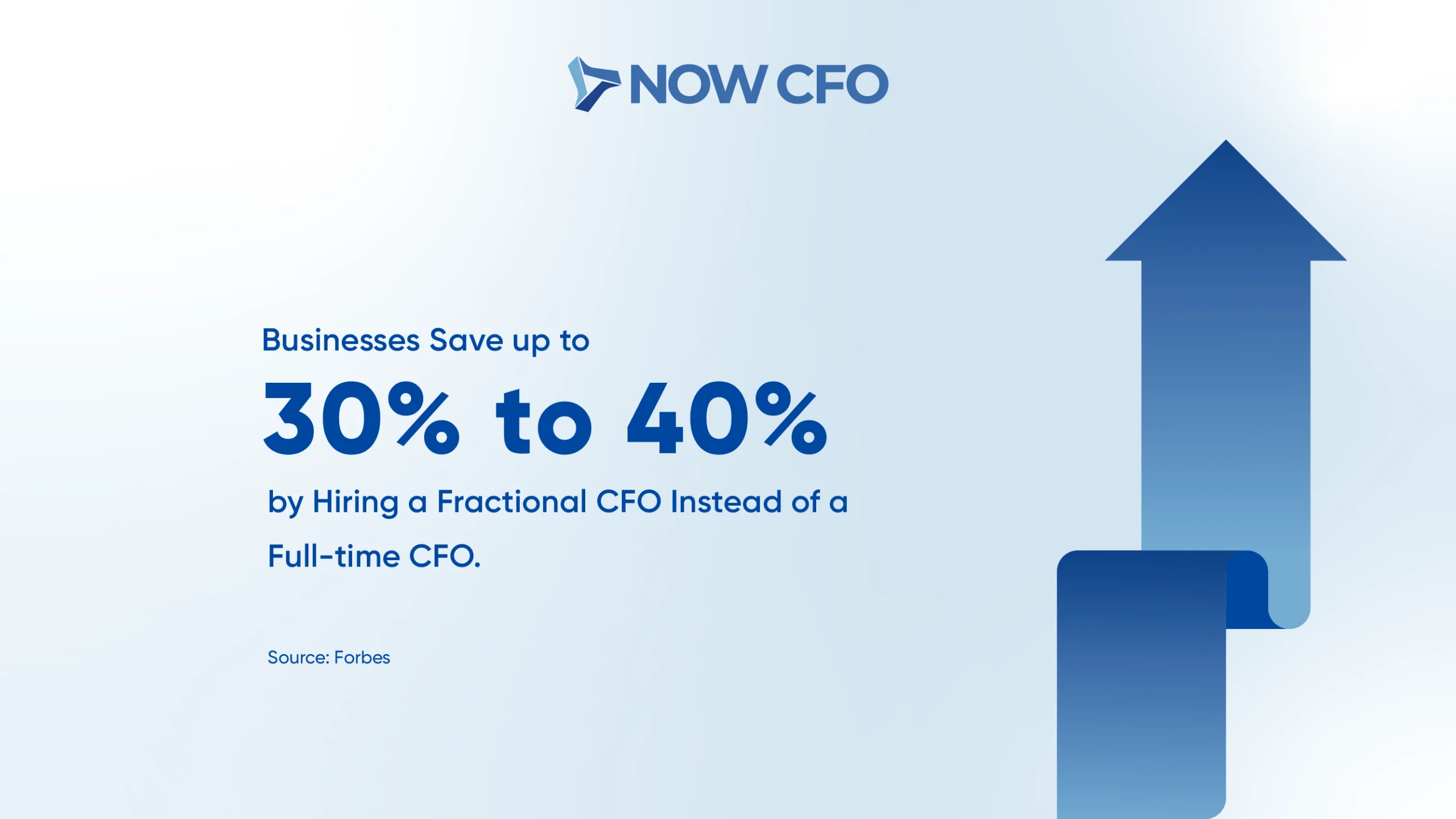
To hire full-time CFOs, companies must spend $250K to $400K annually (plus benefits). This cost is not feasible for most startups and SMEs. In contrast, on average, fractional CFO costs around $12 K per month.
This enables businesses to reduce CFO-related expenses by 30% to 40% while maintaining high-caliber financial leadership. Fractional CFOs are often seasoned professionals who bring on-demand expertise tailored to your company’s most pressing needs.
Source: Forbes
Reason 2: Soaring Market Demand for Fractional CFOs
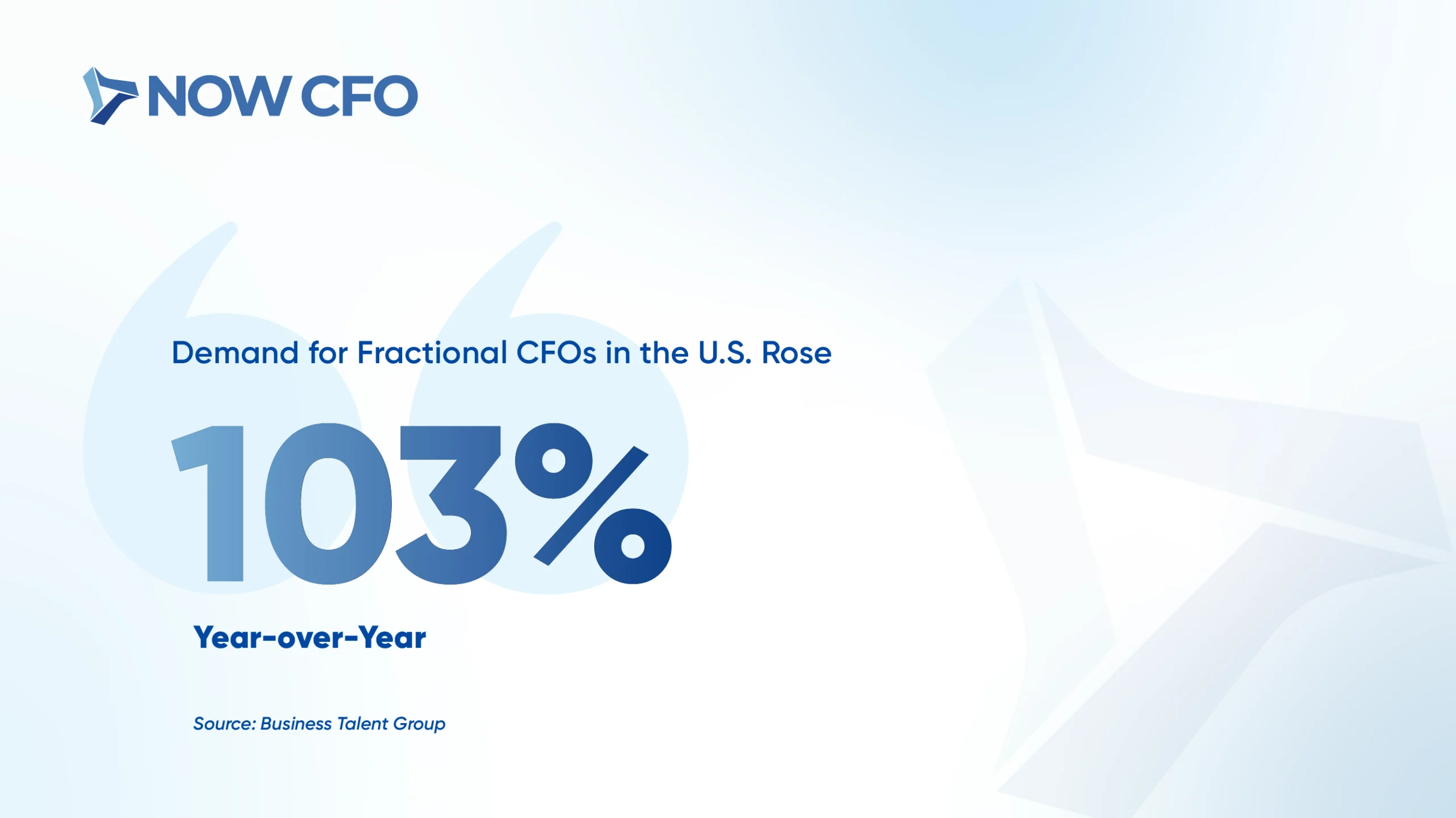
The demand for fractional CFOs in the U.S. has skyrocketed, with a staggering 103% year-over-year increase. These fractional CFO trends reflects a significant shift in how businesses, especially startups and growth-stage companies, approach financial leadership.
Instead of committing to the high fixed costs of full-time CFOs, companies are turning to fractional solutions that deliver flexibility without sacrificing strategic expertise.
This surge in demand demonstrates that an increasing number of businesses are recognizing the benefits of experienced, project-based financial leadership. With fractional CFOs, companies can access tailored financial strategies, budget oversight, and forecasting support exactly when needed.
Source: Business Talent Group
Reason 3: Rising CFO Turnover Driving Part-Time Financial Leadership
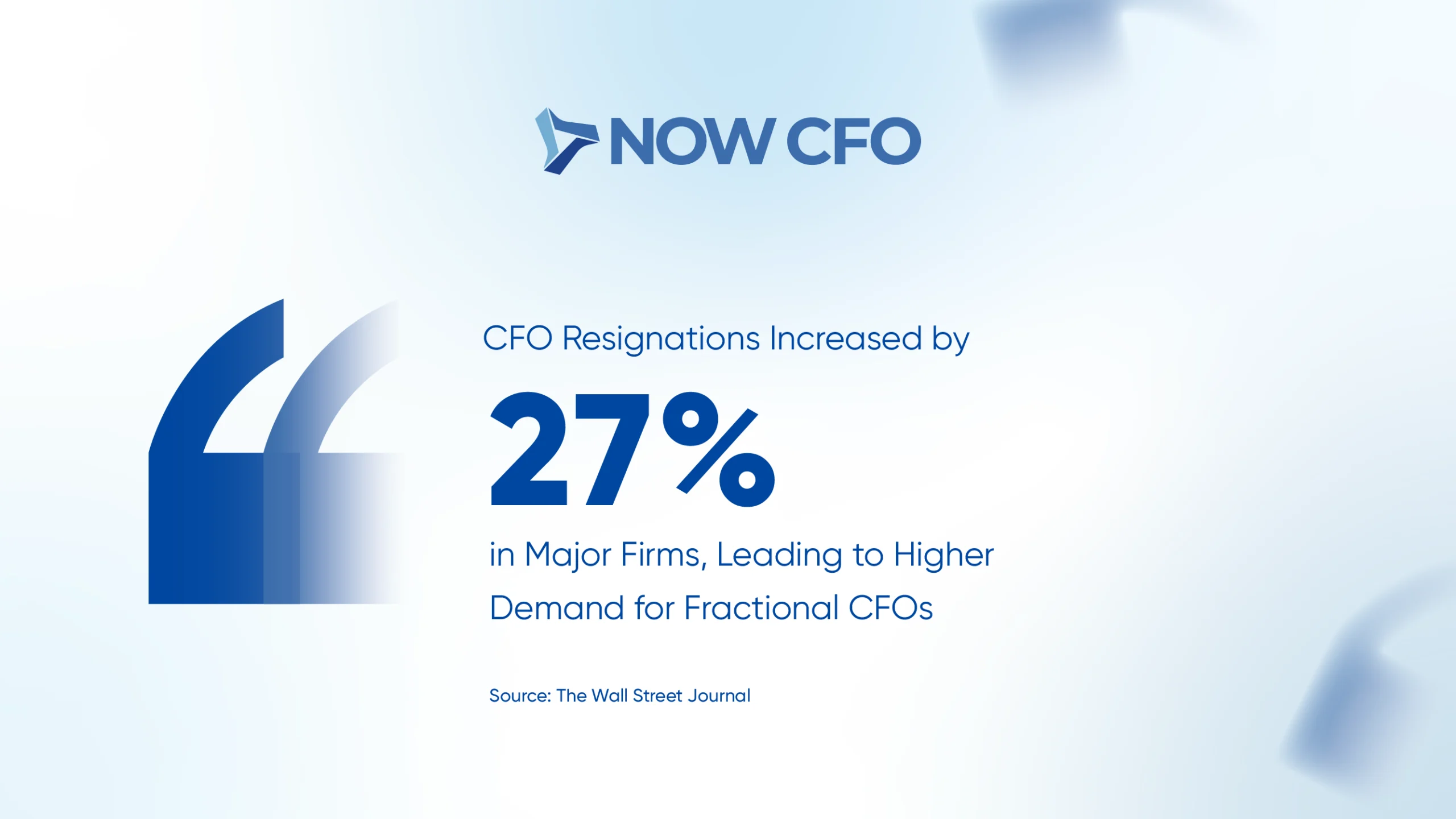
The executive talent market is evolving rapidly. Between 2019 and 2020 alone, CFO resignations spiked by 27%, creating significant leadership gaps for businesses of all sizes. This trend accelerated the need for part-time, interim, and fractional CFO solutions to fill the void left by departing finance leaders.
Fractional CFOs have become the ideal bridge, providing experienced financial oversight without the long hiring timelines or hefty compensation packages of permanent hires. They ensure stability, strategic continuity, and investor confidence while allowing businesses the flexibility to decide on their long-term leadership needs.
Source: The Wall Street Journal
Reason 4: Fractional Executive Workforce Has Doubled Since 2022
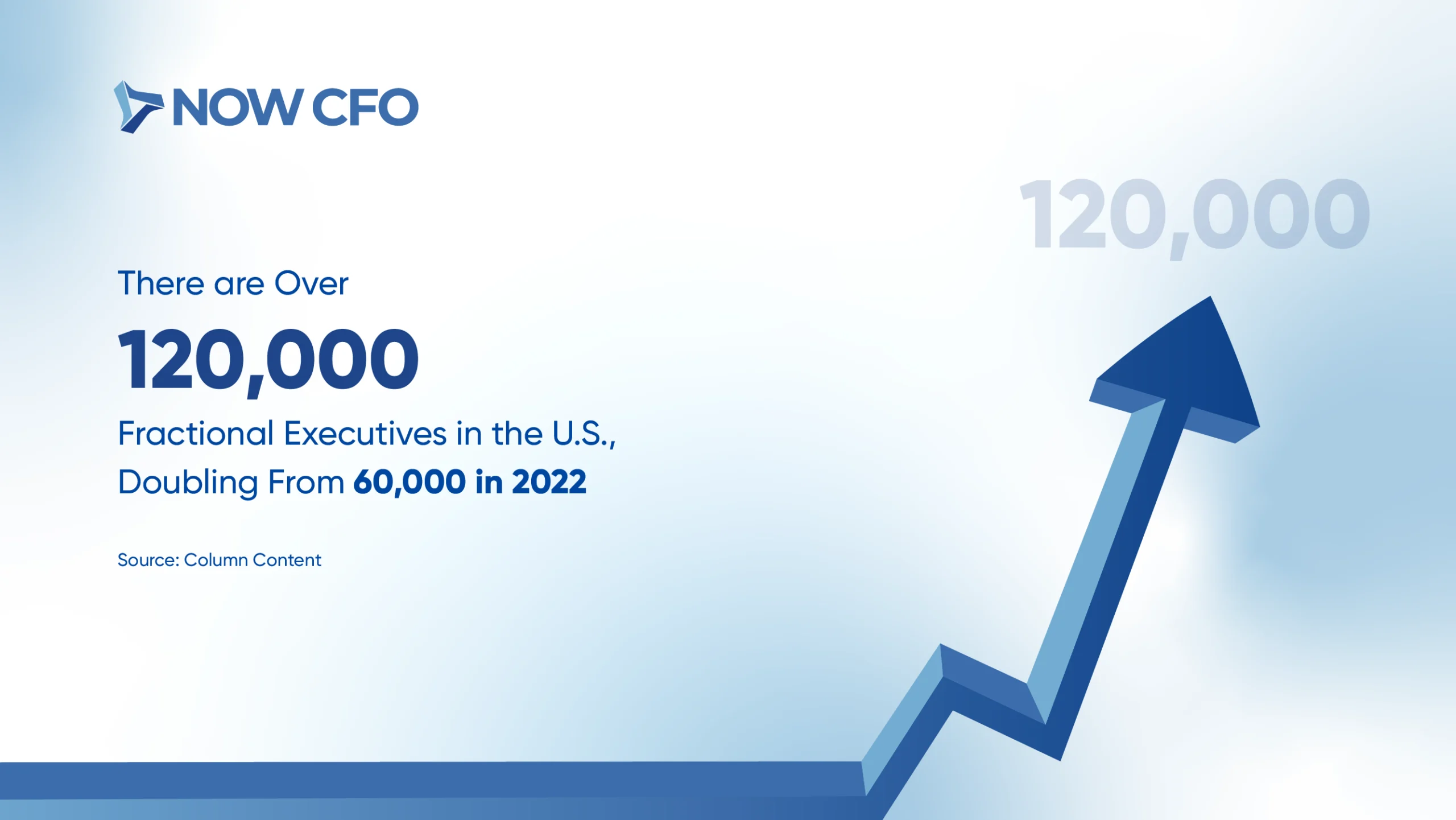
The fractional executive workforce in the U.S. has experienced unprecedented growth, doubling from 60,000 in 2022 to over 120,000 today. This rapid expansion reflects how companies embrace flexible leadership models to navigate economic uncertainty, growth challenges, and evolving market demands.
With more qualified executives opting for fractional roles, businesses can access a deep, diverse talent pool without the high overhead. For financial leadership, fractional CFOs allow companies to harness strategic expertise, improve forecasting, and cost-effectively enhance profitability on demand.
Source: Column Content
Reason 5: Access to Highly Seasoned Financial Leaders
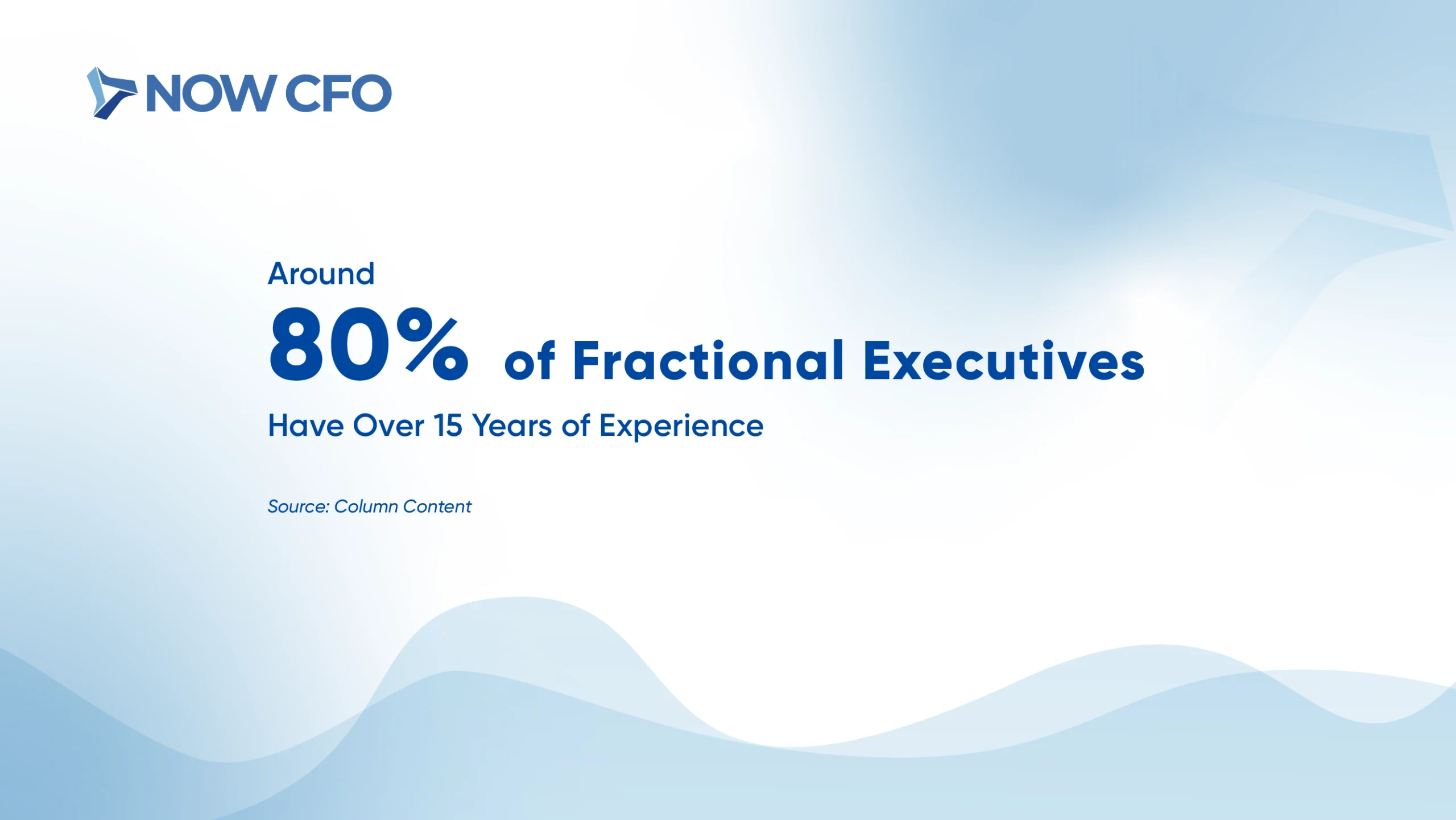
When it comes to financial leadership, experience is non-negotiable. Fortunately, businesses that opt for fractional CFOs don’t have to compromise. Approximately 80% of fractional executives bring more than 15 years of professional expertise, equipping them to handle complex financial challenges confidently.
This wealth of experience ensures that fractional CFOs can immediately step into your business, understand its unique financial landscape, and deliver results. Whether it’s navigating a fundraising round, improving cash flow, or supporting strategic growth, fractional CFOs provide the high-level insights typically expected from veteran executives, without the full-time price tag.
Source: Column Content
Reason 6: Scalable Support Across Multiple Companies
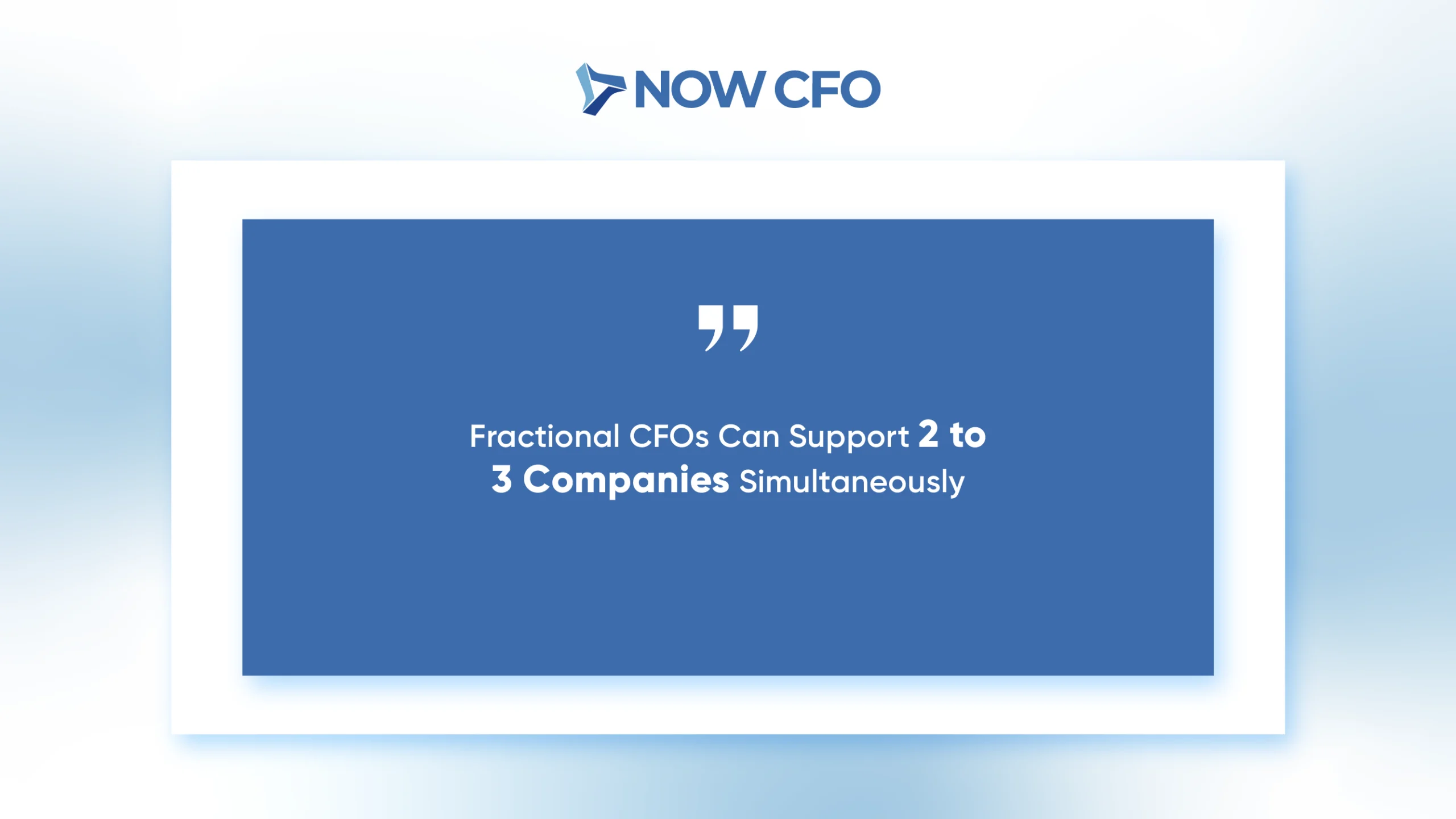
Fractional CFOs are designed for efficiency, offering their expertise to multiple businesses at once. Most fractional CFOs comfortably manage financial leadership across 2 to 3 companies simultaneously, providing tailored support exactly when each organization needs it.
This creates a scalable, on-demand solution for startups, SMEs, and private equity-backed firms to access top-tier financial guidance. It allows companies to gain strategic insights, improve financial processes, and drive growth without committing to the cost or structure of a full-time CFO.
Reason 7: C-Suite Caliber Leadership Without Full-Time Costs
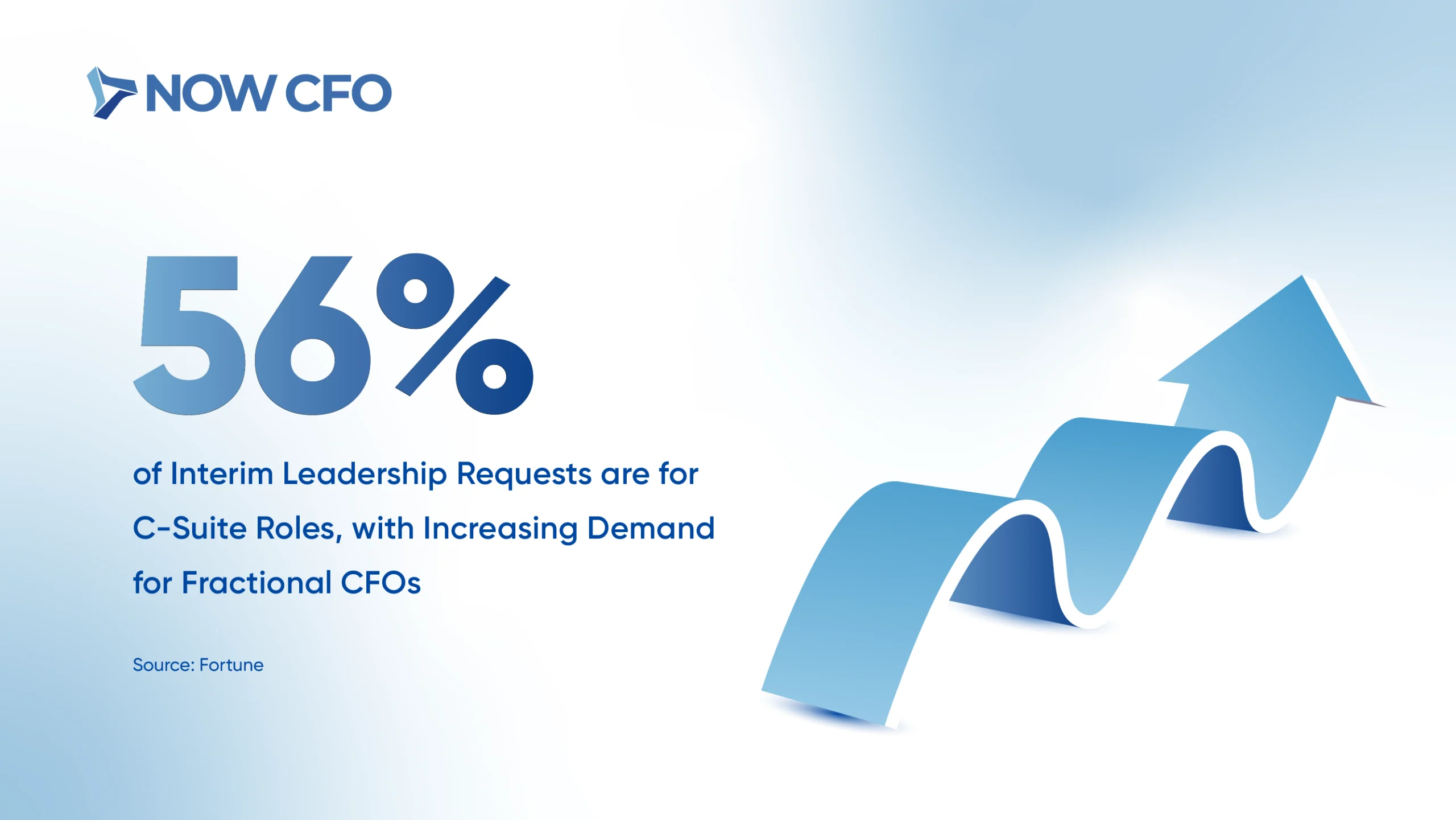
Demand for interim and fractional C-suite leaders has surged as businesses strive to stay agile in uncertain markets. 56% of all interim executive requests are for C-suite positions, with fractional CFOs experiencing one of the fastest-growing demand curves.
This trend highlights the increasing reliance on experienced, part-time financial leaders to drive strategic initiatives, manage risk, and provide operational oversight. Fractional CFOs offer companies the ability to secure C-level expertise quickly and affordably, ensuring businesses stay competitive without incurring the fixed costs of a full-time hire.
Source: Fortune
Conclusion
Fractional CFOs have become a game-changer for businesses seeking financial expertise without the burden of a full-time hire. Their ability to deliver strategic guidance, experienced leadership, and flexible support makes them an ideal solution for companies navigating growth, change, or financial complexity.
From improving cost efficiency to providing seasoned financial insight, fractional CFOs empower organizations to make better decisions, enhance financial operations, and maintain stability during critical transitions. Their scalable approach allows businesses to access high-level financial leadership precisely when needed, without overextending resources.
Ready to see what fractional leadership could do for your balance sheet? Book a no-obligation strategy session to explore NOW CFO’s tailored fractional CFO services, your first step toward a brighter, more agile financial future.
Frequently Asked Questions
Why are Fractional CFOs Considered the Future of Financial Leadership?
They offer on-demand, flexible financial leadership that adapts to modern business needs. This allows companies to access high-level expertise without committing to full-time costs.
How Much Does a Fractional CFO Cost Compared to a Full-Time CFO?
Businesses typically save 30% to 40% by choosing fractional CFO services over hiring a full-time executive. You only pay for the strategic support and time your company needs.
What Types of Businesses Benefit Most From Fractional CFOs?
Growing startups, private equity-backed companies, and businesses facing financial complexity benefit most. Fractional CFOs provide scalable, expert financial guidance tailored to changing needs.
How do Fractional CFOs Use Technology?
They implement tools like cloud-based accounting, AI forecasting, and real-time dashboards to improve financial visibility. This helps businesses make faster, more informed decisions.
Is Hiring a Fractional CFO Better Than Outsourcing Bookkeeping?
They solve different problems; bookkeeping manages records, while fractional CFOs drive financial strategy and growth. Startups often need both to build a strong financial foundation.
Businesses today have an incredible advantage with the advancement of technology—especially
when it comes to ERP (Enterprise Resource Planning) systems. If applied correctly, these tools
can revolutionize a company’s operational and financial management. But having entered the
business world several decades ago, I can tell you: it hasn’t always been this way.
When I first started working in accounting, “the books” were literal—physical ledgers lining the
office shelves. We manually posted transactions into the general ledger, sales ledger, and
payables ledger. Invoices were typed or handwritten. Checks, too. Each one had to be posted and
recorded by hand. If you remember carbon paper, you know the pain of payroll tax formsevery
typo had to be corrected on each carbon copy.
As technology advanced, tape-driven machines and punch cards began to automate customer
and vendor transactions. If you wanted an aging report for receivables or payables, you fired up
the machine and hoped that by morning, the green bar paper hadn’t jammed. Then came the
affordable computer systems—the NCR 9300, IBM 3600, Sperry Univac, and others—bringing a new
wave of capability to companies willing to make the leap.
In the early ‘80s, I was hired by a manufacturing company to help them migrate from an
engineering-focused system to one that could support full financial accounting and MRP (Material
Requirements Planning). Back then, companies didn’t just buy software based on a demo. We
partnered with our CPA firm to create a comprehensive Request for Proposal (RFP), which turned
into a 2.5-inch thick binder. Department heads and key staff across the organization contributed
to this document, ensuring that our future ERP system would support every area of the business.
Once finalized, the RFP was sent to a number of vendors. But there was one non-negotiable
condition: vendors had to allow us to run our own test data through their systems. We wanted to
see exactly how transactions flowed and whether the reports matched our expectations. Some
vendors dropped out quickly—they either couldn’t meet the requirements or weren’t confident in
their systems. Others simply didn’t complete the RFP.
Eventually, it came down to IBM and NCR. We initially leaned toward IBM, but when our leadership
asked their sales lead when implementation could begin, the answer was surprising—September. It
was May. That delay cost them the deal.
NCR, on the other hand, was ready to start almost immediately. There was one condition: someone
from our company had to attend six weeks of intensive training at NCR locations around the
country. I was that someone. My journey took me to Dayton, Boston, and Denver. In hindsight, that
training was essential. It provided the foundation needed for a successful implementation and
prevented countless frustrations down the road.
One of the most critical lessons I learned during this process was the importance of proper file
mapping. How data is structured and reported in a system often comes down to a few key
decisions—some of which are irreversible once implemented. With NCR’s guidance, our team took
its time and made informed, deliberate choices.
Fast forward to the later years of my career: I’ve seen many companies struggle with poor ERP
implementations. Often, it’s not because the software itself is lacking, but because the mapping
wasn’t done correctly—or worse, no one took ownership of it. Inventory costs don’t hit COGS
properly. Reports are inaccurate. Leadership doesn’t trust the data. These issues are common when
corners are cut early in the process.
One client came to us with exactly this problem. Their inventory data wasn’t mapping to cost of
goods sold correctly, and they couldn’t rely on their reporting. Fixing it required time, money, and
navigating significant workarounds.
Another often overlooked issue is data integrity—ensuring the information transferred from the old
system to the new one is accurate and complete. Many clients I’ve worked with ignored this step,
and it led to widespread frustration among users and decision-makers alike. In our NCR example,
we ran the new system in parallel with the old one to ensure everything matched before fully
transitioning.
Today, it’s not uncommon to hear horror stories from businesses that implement ERP systems only
to be left with minimal training—perhaps two weeks on-site or remote, followed by links to YouTube
or cloud-based resources. The client is essentially left to figure things out on their own. While the
technology has improved, the discipline behind ERP implementation has diminished.
Cost is often cited as the main driver for rushing the process or cutting corners. But what appears
to be a cost-saving decision on the front end frequently turns into a costly mistake when the
system doesn’t perform as expected, and outside consultants are brought in to clean up the mess.
My advice to business owners considering a new ERP system is simple:
• Take your time. Don’t rush the selection or implementation process.
• Demand proof. Require vendors to demonstrate their system using your real data.
• Ensure accountability. Clarify who is responsible for file mapping and system setup.
• Invest in training. A well-trained team ensures smoother adoption and better outcomes.
• Validate data integrity. Run parallel systems and confirm everything before flipping the switch.
A properly implemented ERP system can transform a business—improving decision-making,
increasing reporting accuracy, and saving time. But those benefits only come when the foundation
is built with care.
Copyright 2025-Clouser On Business
83% of business leaders agree that financial transparency is essential for earning trust from investors, stakeholders, and internal teams. Yet, many growing companies still grapple with inconsistent reporting, unclear data, and limited financial visibility.
Without standardized processes and real-time finance data, even the most promising businesses can face critical blind spots. That’s where outsourced CFOs come in.
These experienced financial leaders bring proven systems, strategic oversight, and objective insight to enhance financial transparency.
Revenue Growth Through Financial Expertise
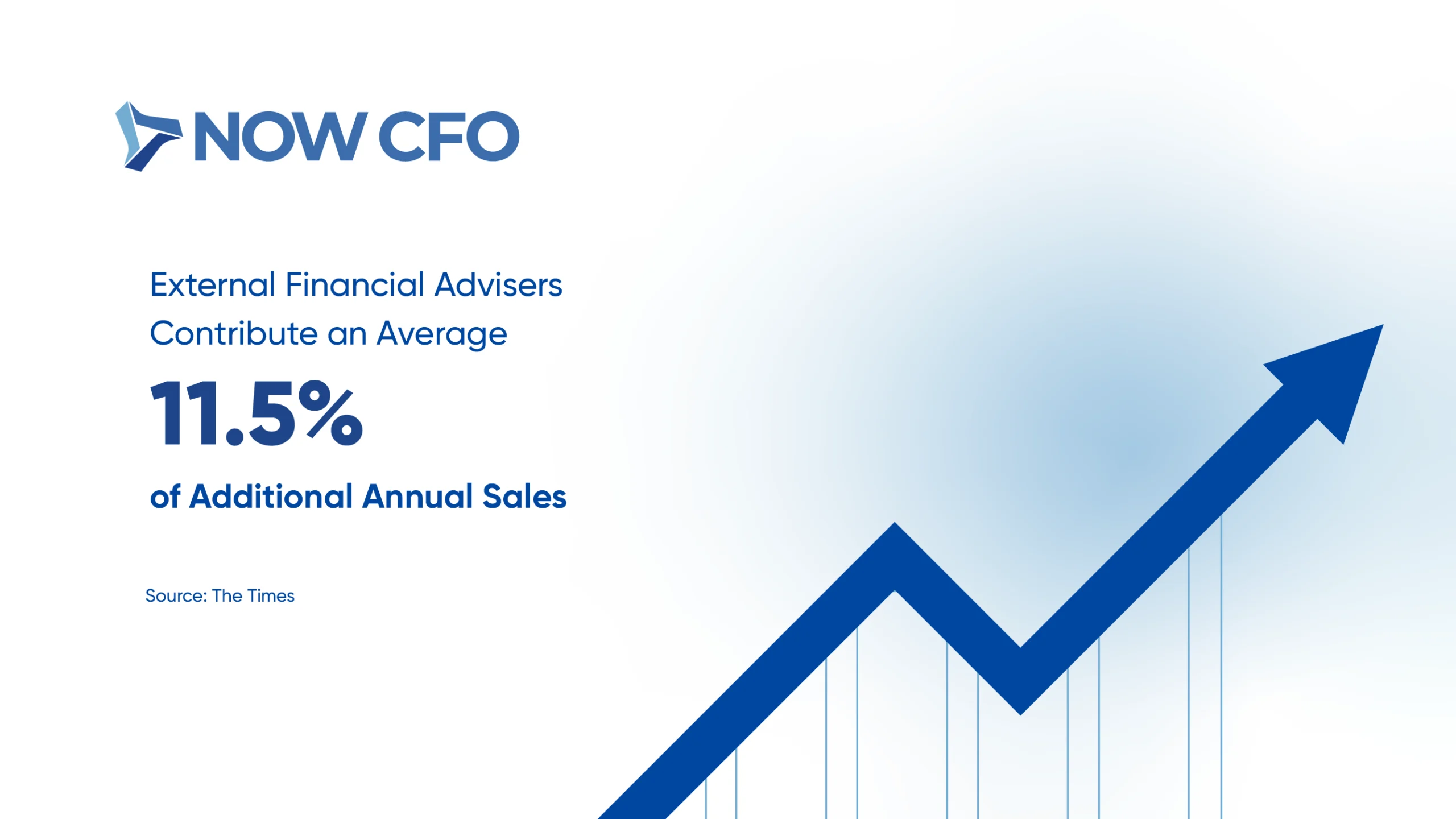
Partnering with external financial advisers can significantly boost business revenue. A study published by The Times found that companies leveraging outside financial expertise experienced an average increase of 11.5% in annual sales.
This uplift stems from improved financial strategy, sharper forecasting, and access to high-level decision-making insights; benefits typically associated with seasoned CFO leadership without the full-time cost burden.
Source: The Times
Efficiency Gains Through Outsourced Reporting
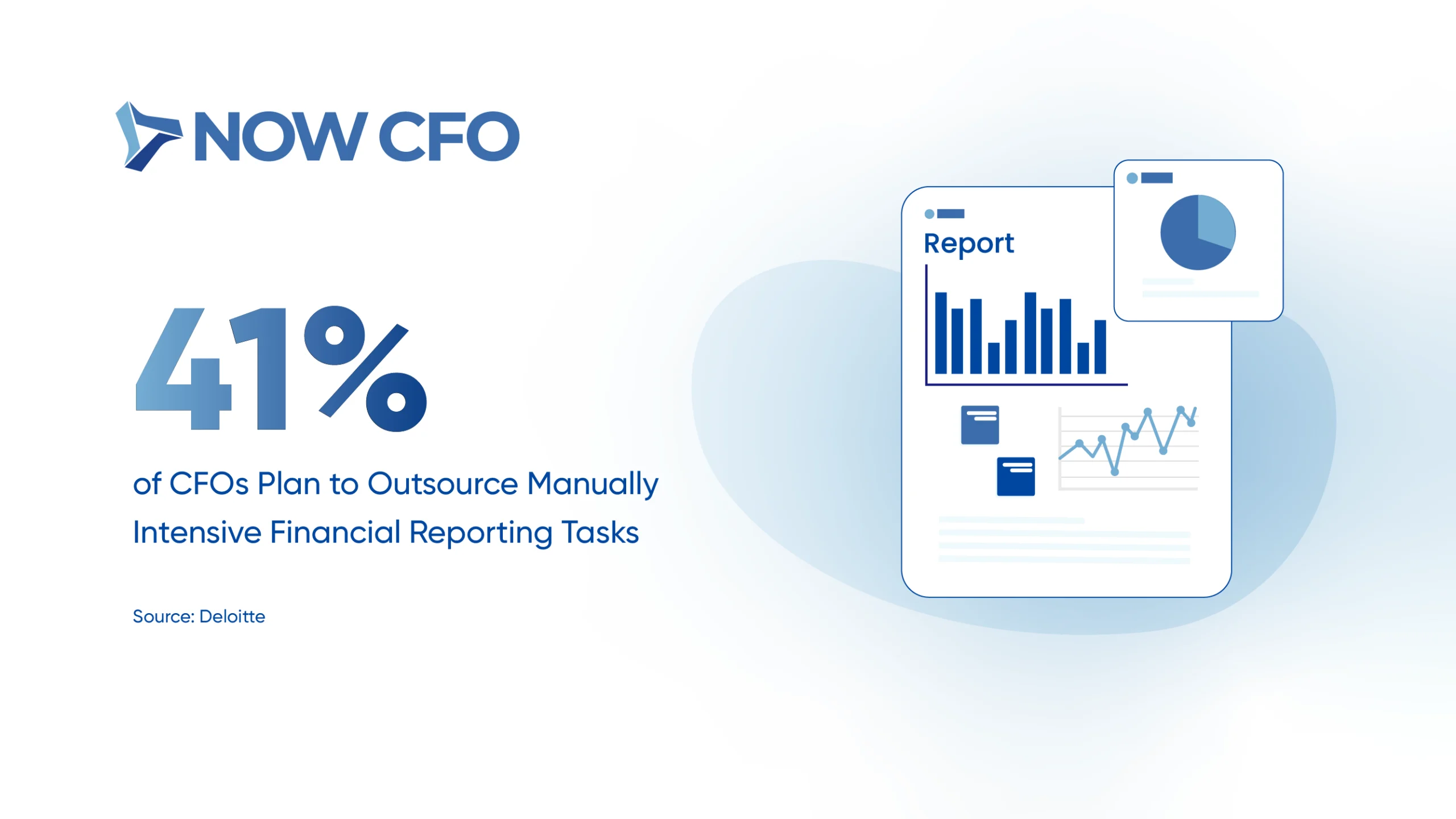
Manual financial tasks can drain resources and hinder strategic focus. According to Deloitte, 41% of CFOs intend to outsource these time-consuming processes, such as data compilation, reconciliations, and basic reporting.
By delegating routine financial work to outsourced professionals, in-house teams can redirect efforts toward high-value analysis, forecasting, and growth initiatives, enhancing overall finance team performance.
Source: Deloitte
Cost Reduction as a Primary Driver for Outsourcing
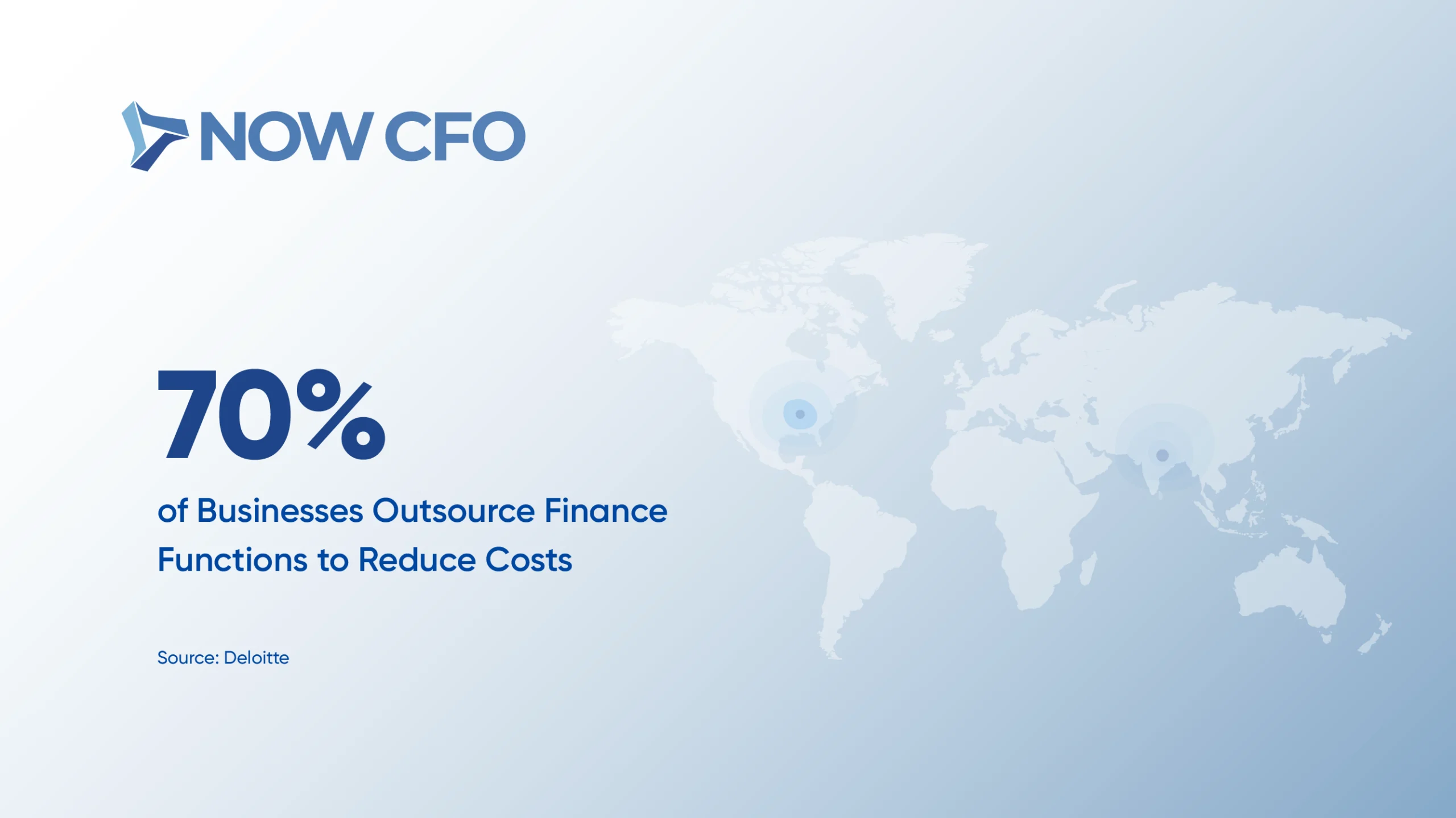
Outsourced CFO services allow companies to avoid the hefty overhead of a full-time executive, including salary, benefits, and recruitment. This strategic move not only lowers operational expenses but also provides access to experienced finance professionals on a flexible basis, delivering more value per dollar spent.
Source: Deloitte
Modernizing Finance with Technology
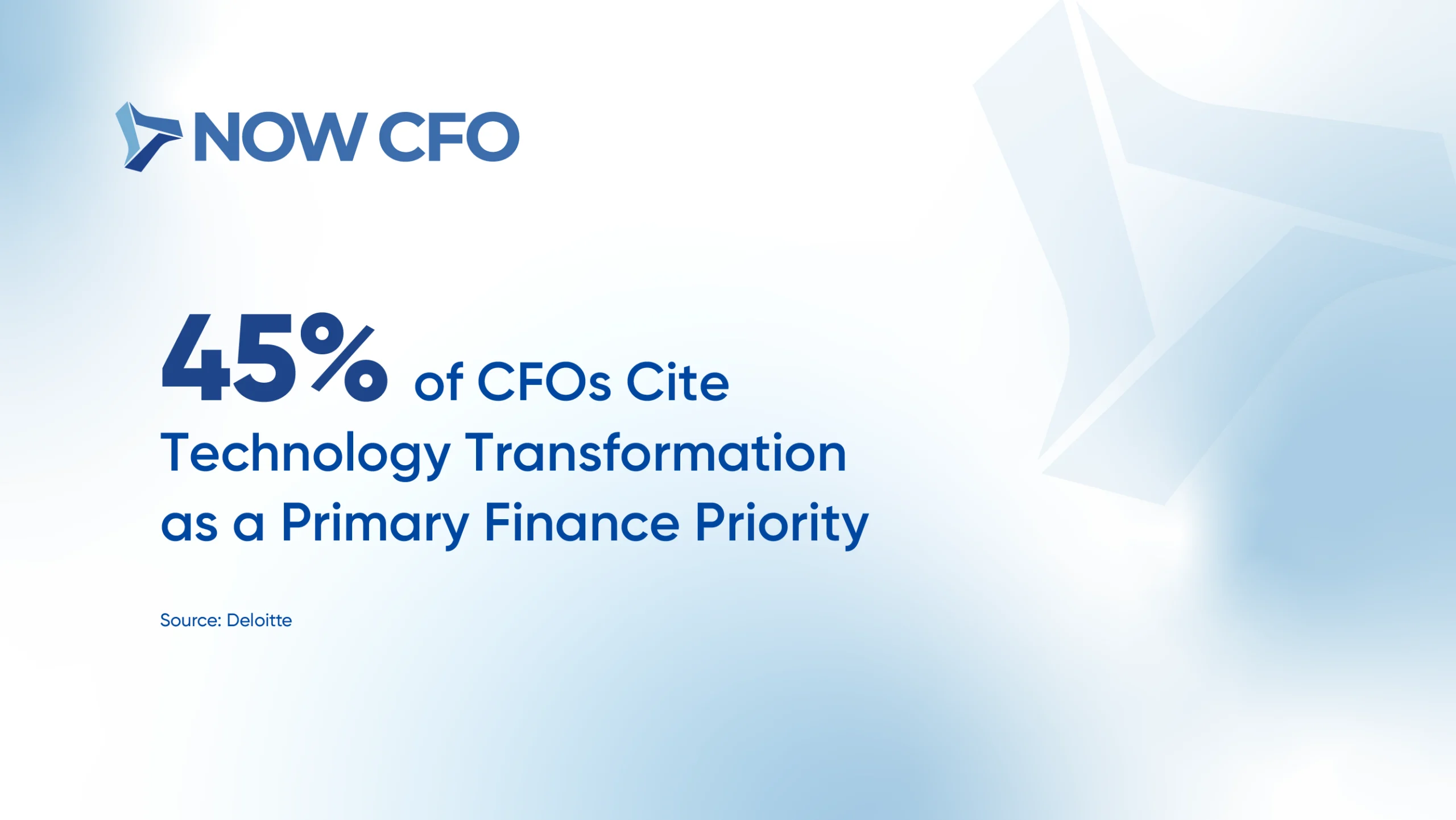
In the evolving finance landscape, technology adoption is critical. Deloitte reports that 45% of CFOs prioritize technology transformation to replace outdated systems with modern tools that enable transparent reporting and faster decision-making.
Outsourced CFOs play a key role in this shift, bringing expertise in integrating dashboards, automation tools, and reporting platforms that improve visibility, reduce manual errors, and support agile operations.
Source: Deloitte
Transparency and Efficiency Drive Outsourcing Decisions
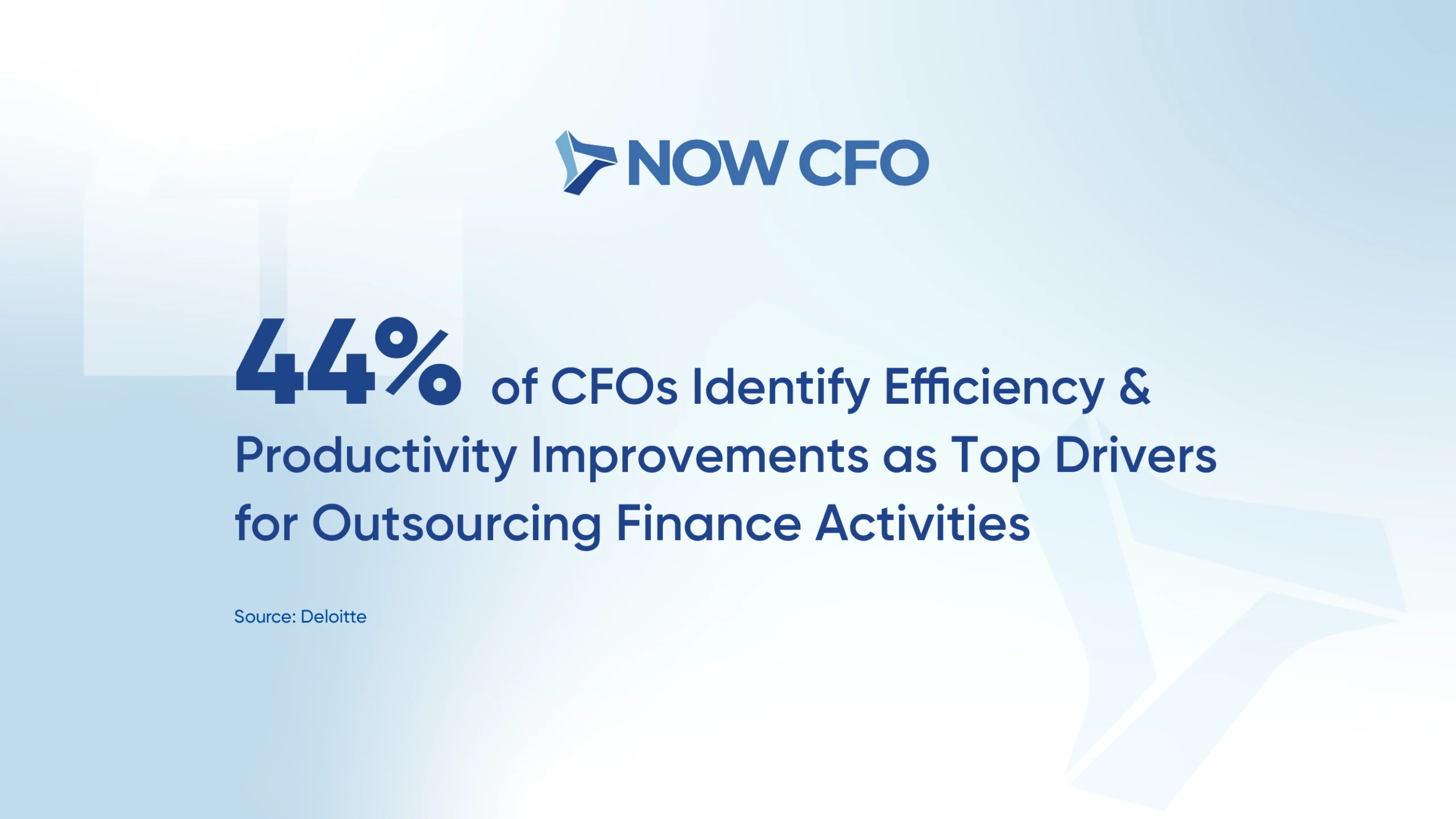
Efficiency isn’t just a benefit; it’s a leading reason for outsourcing. Deloitte research reveals that 44% of CFOs use outsourced strategic finance services to improve productivity and enhance financial transparency.
By shifting finance functions to external experts, businesses streamline workflows, reduce bottlenecks, establish consistency, and boost financial reporting accuracy. The result is greater operational focus and more reliable decision-making data.
Source: Deloitte
Automation Enhances Accuracy and Availability
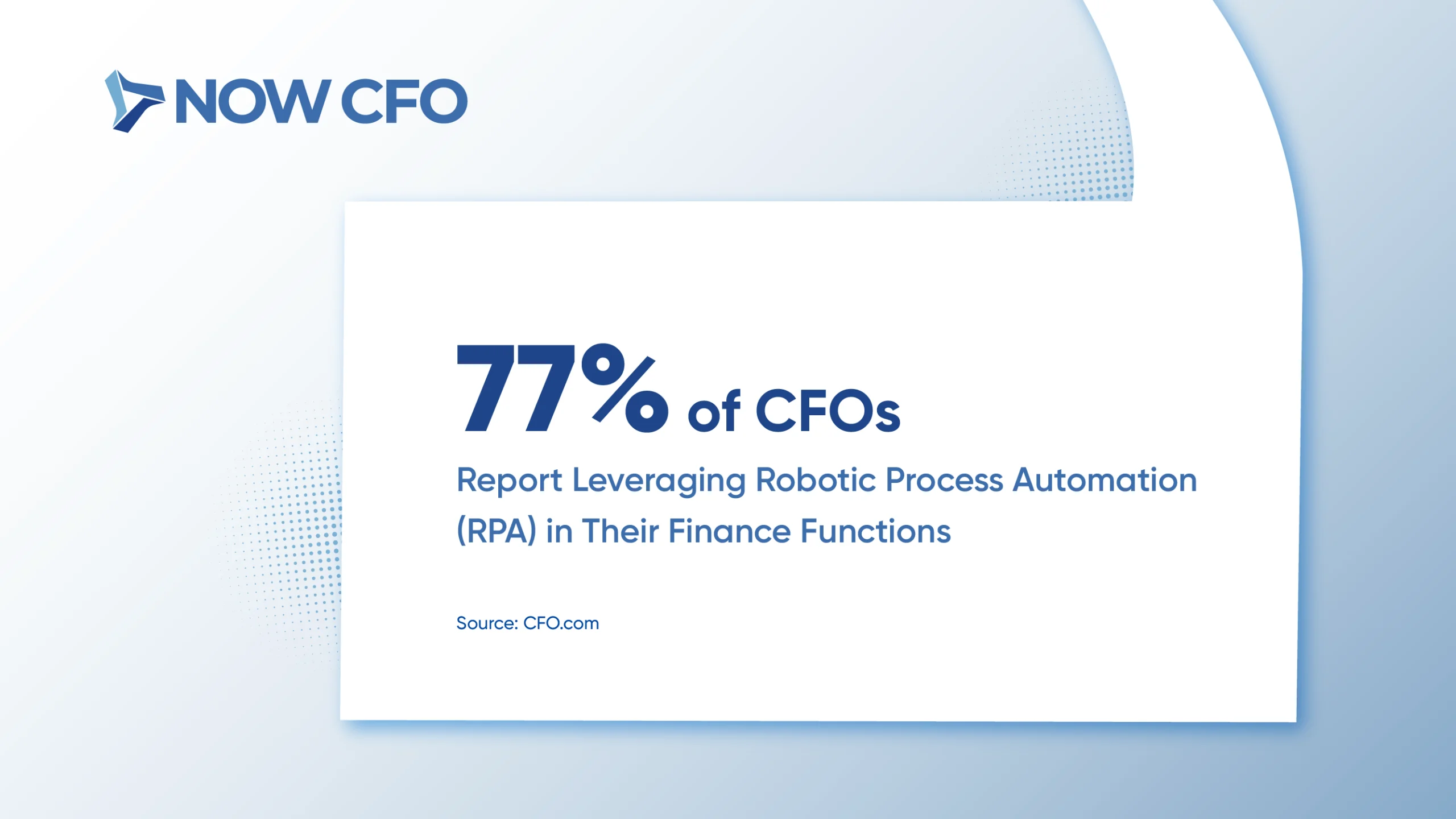
Robotic Process Automation (RPA) is reshaping modern finance departments. According to CFO.com, 77% of CFOs already use RPA to eliminate manual errors and accelerate financial data availability.
Outsourced CFOs often lead these technology implementations, deploying automation tools that improve reporting accuracy, increase efficiency, and reinforce transparent financial operations.
Source: CFO.com
Strategic Focus Enabled by Outsourcing
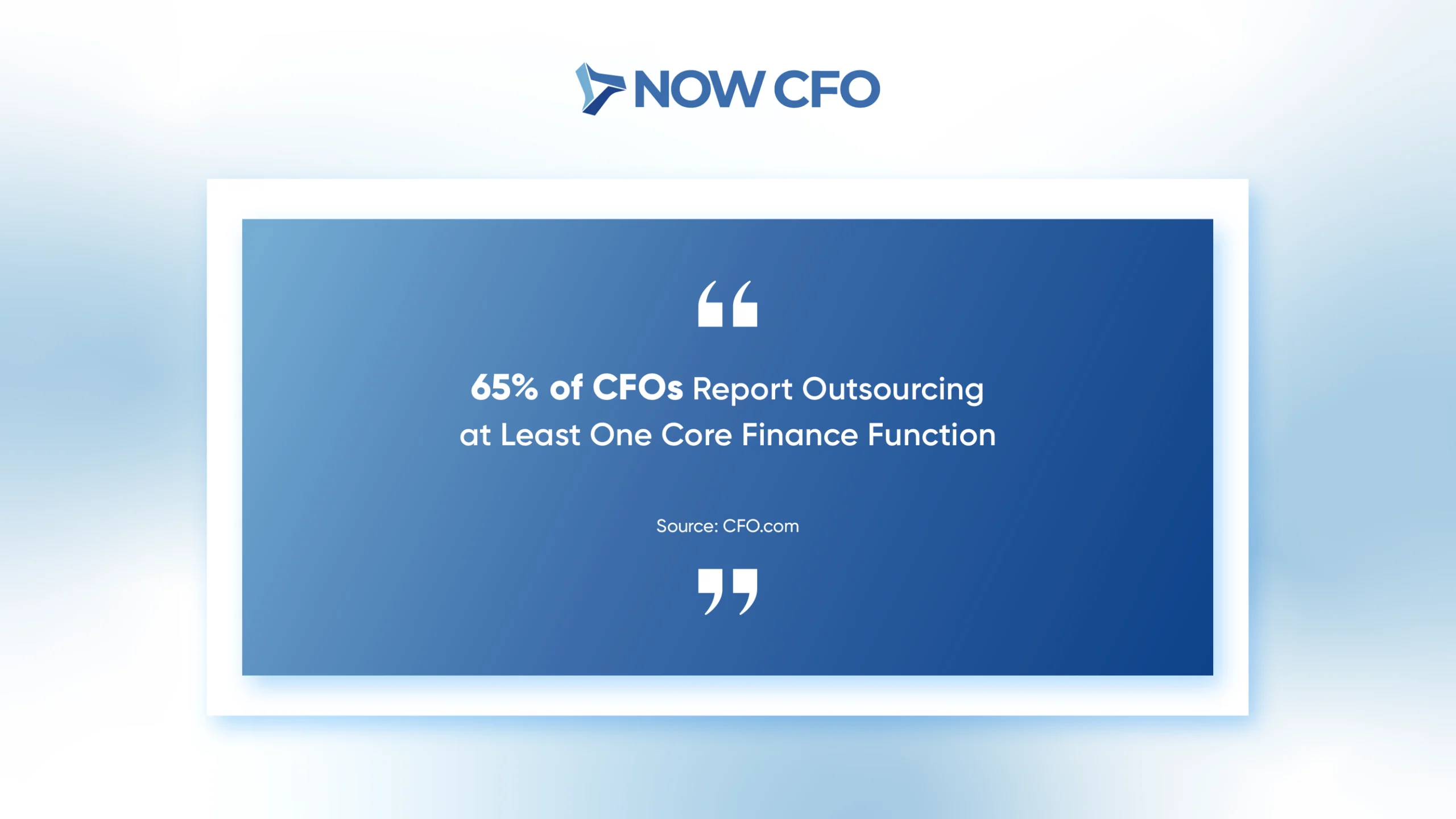
A growing number of finance leaders are embracing outsourced models. CFO.com reports that 65% of CFOs now outsource at least one core finance function, allowing their internal teams to focus more on strategic planning and transparent reporting.
Outsourced CFOs help refine processes, implement real-time dashboards, and improve audit readiness, giving companies a clearer financial picture while staying lean and focused.
Source: CFO.com
Automation Cuts Close Times, Boosts Transparency
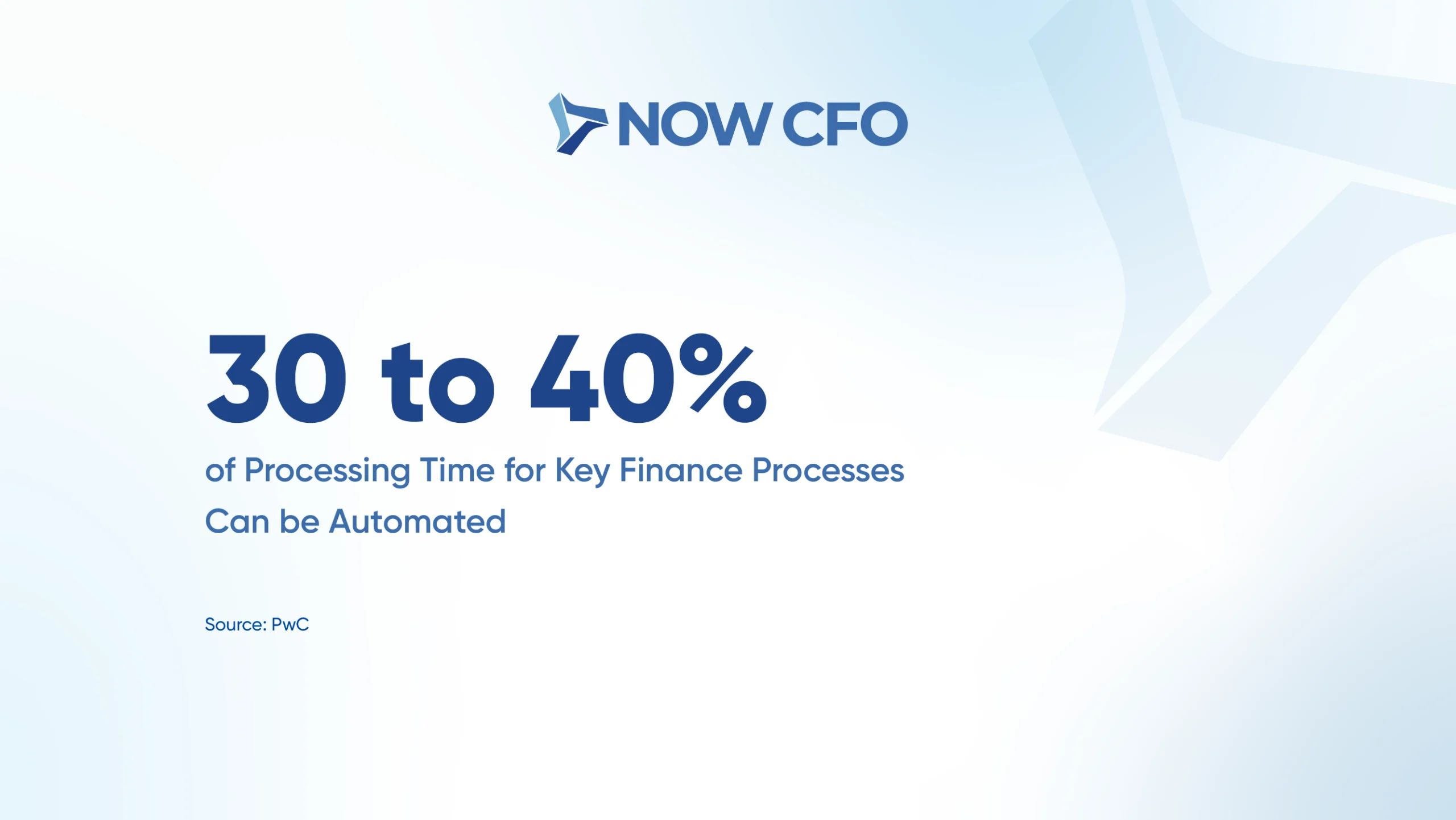
PwC research indicates that 30% to 40% of time spent on core finance tasks, such as reconciliations, closing the books, and reporting, can be automated.
This slashes cycle times and enhances financial transparency by reducing human error and delivering faster, more accurate reports. Outsourced CFOs are well-versed in implementing automation strategies that optimize internal workflows and support better decision-making.
Source: PwC
Conclusion
Financial transparency empowers leadership with the tools and insights to make informed, confident decisions. From standardized reporting practices to real-time dashboards and policy enforcement, the outsourced CFO role is crucial for creating a culture of accountability and clarity.
As you prepare for growth, audits, or investment, an outsourced CFO can provide the systems, structure, and strategic oversight needed to enhance financial transparency and build long-term trust with your stakeholders.
Want to build a more transparent financial system for your business? Contact NOW CFO today to schedule a free consultation and explore how expert financial leadership can drive your next phase of success.
FAQs
How do outsourced CFOs help with financial transparency?
Outsourced CFOs implement structured systems, internal controls, and consistent reporting practices that enhance financial transparency. They provide accurate and timely financial data, ensuring compliance and enabling business leaders to make informed decisions with confidence.
What tools do CFOs use to improve reporting accuracy?
CFOs use financial dashboards, forecasting software, and ERP systems to deliver transparent reporting. These tools enable real-time KPIs, budget variances, and cash flow tracking —key components of maintaining financial clarity.
Can a part-time CFO handle audits and compliance effectively?
Yes, many outsourced CFOs specialize in audit readiness and compliance. They prepare GAAP-compliant reports, standardize documentation, and create audit trails to ensure smoother, faster external audits.
How does real-time reporting improve decision-making?
Real-time financial reporting gives leadership up-to-date insights into business performance. This visibility supports agile budgeting, helps identify risks early, and enhances department accountability.
What does transparent financial management mean?
Transparent financial management entails clear, accurate, and timely reporting that all stakeholders can easily understand. It reduces guesswork, fosters trust, and aligns everyone’s financial health and direction.
Did you know that fractional CFO industry have become one of the fastest-growing trends in financial leadership? Many SME businesses struggle to justify the full-time CFO’s high fixed costs and rigid commitments, only to face gaps in strategic financial oversight.
These CFO outsourcing statistics reveal why more companies choose project-based CFO expertise to drive profitability, from skyrocketing demand and global market size projections to sector-specific adoption rates. Read on to discover how your business can benefit from a fractional CFO’s flexibility and strategic insight.
33% of US Small Businesses Outsource Operations
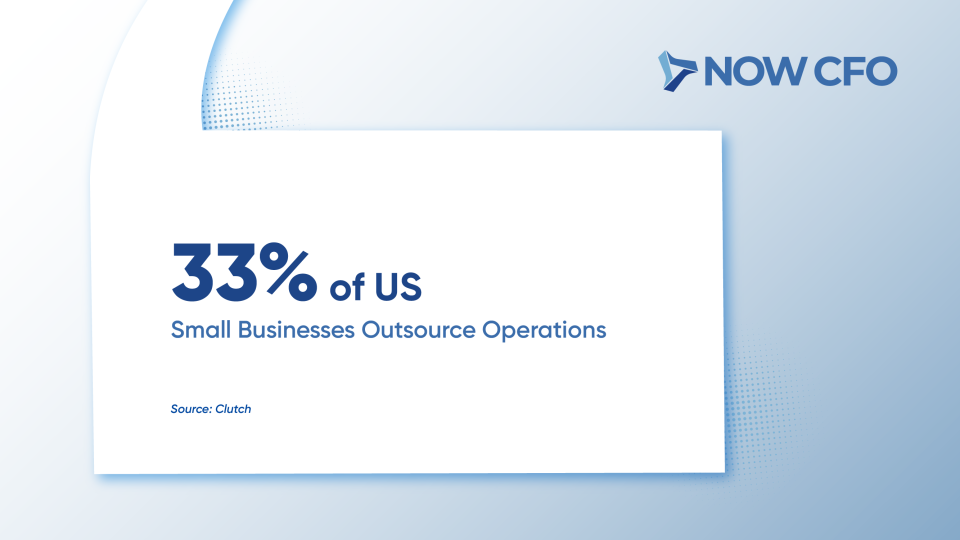
Over one-third of U.S. small businesses now outsource at least one core operation, most commonly finance and accounting functions, to external specialists. This trend reflects a strategic shift from the traditional full-time hire model, as smaller companies seek to control overhead while benefiting from high-caliber expertise.
By tapping into fractional CFO services, these businesses secure on-demand financial leadership for tasks like monthly close, cash-flow forecasting, and board-level reporting without the fixed salary commitments of a permanent CFO.
As a result, they enjoy greater budget flexibility, access to seasoned strategic advisors, and the ability to scale financial oversight up or down in line with business cycles.
Source: Clutch
Global BPO Market Expected to Reach $525B by 2030
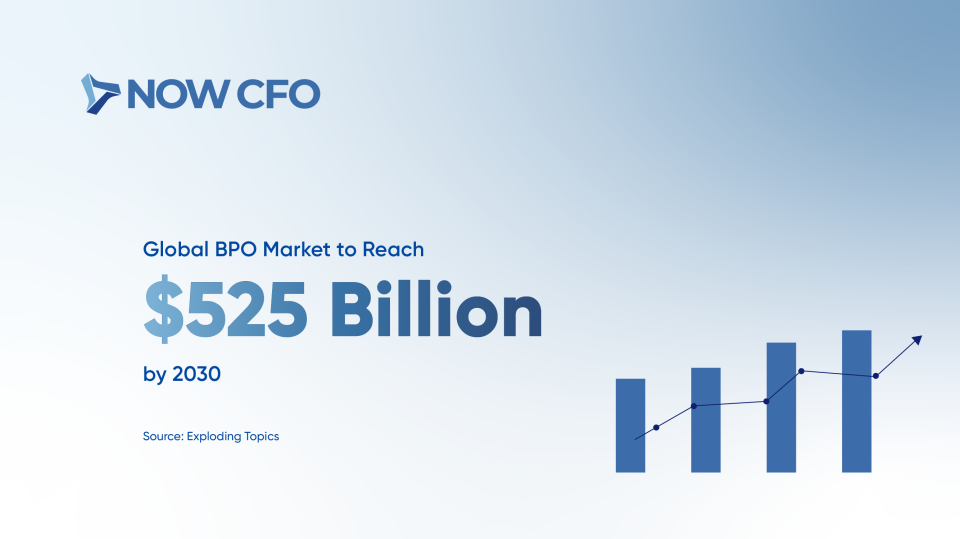
The global business process outsourcing (BPO) industry is forecast to reach $525 billion by 2030, driven by digitally enabled remote service delivery and the rising complexity of back-office functions.
Finance and accounting outsourcers, including fractional CFO providers, are a key growth segment within this market. Companies are increasingly turning to these specialists to handle routine bookkeeping or payroll and fill gaps in financial leadership.
Source: Exploding Topics
83% of SMEs and SMBs Use Business Outsourcing
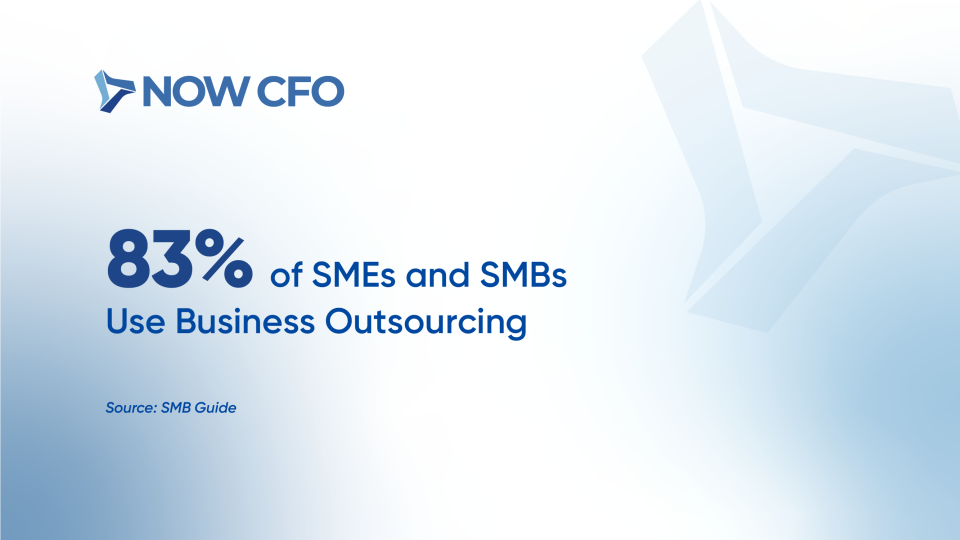
A staggering 83% of SMEs/SMBs now engage with external firms to manage non-core functions, from IT support and customer service to business financial management. Outsourced financial leadership has emerged within this cohort as a powerful lever for improving profitability and operational efficiency.
By outsourcing part-time CFO services, these organizations gain access to expertise in capital planning, risk management, and performance reporting that they might otherwise forgo due to cost or headcount constraints.
Source: SMB Guide
52% of Executives Outsource at Least One Finance Function
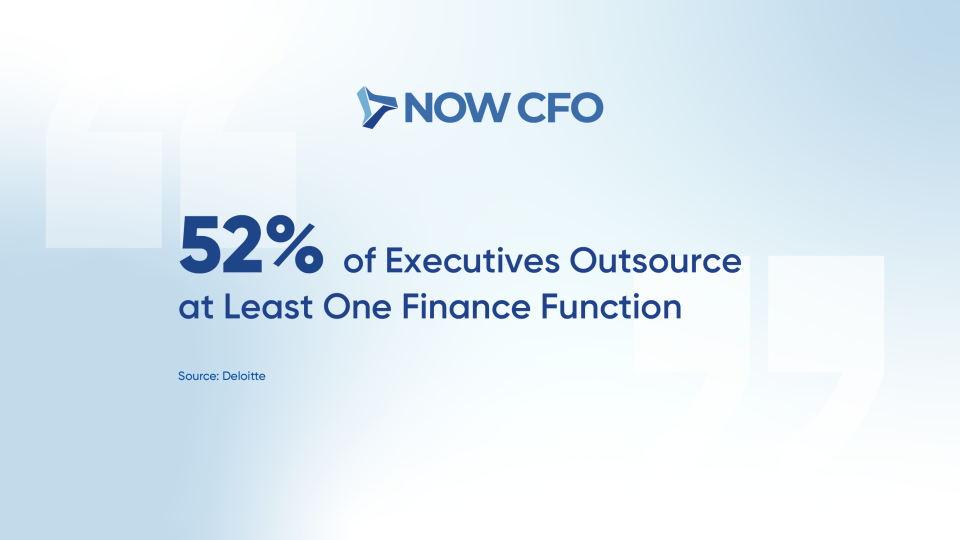
More than half of corporate leaders, 52%, report that they outsource at least one finance function, ranging from accounts payable to strategic cash‐flow analysis. This trend highlights the mainstreaming of financial leadership outsourcing.
By doing so, organizations boost forecasting accuracy, tighten controls around working capital, and free their in-house teams to focus on growth initiatives. The flexibility inherent in fractional engagements allows companies to scale CFO support up or down around peak periods.
Source: Deloitte
54% of Healthcare CFOs Expect Efficiency Gains After Outsourcing
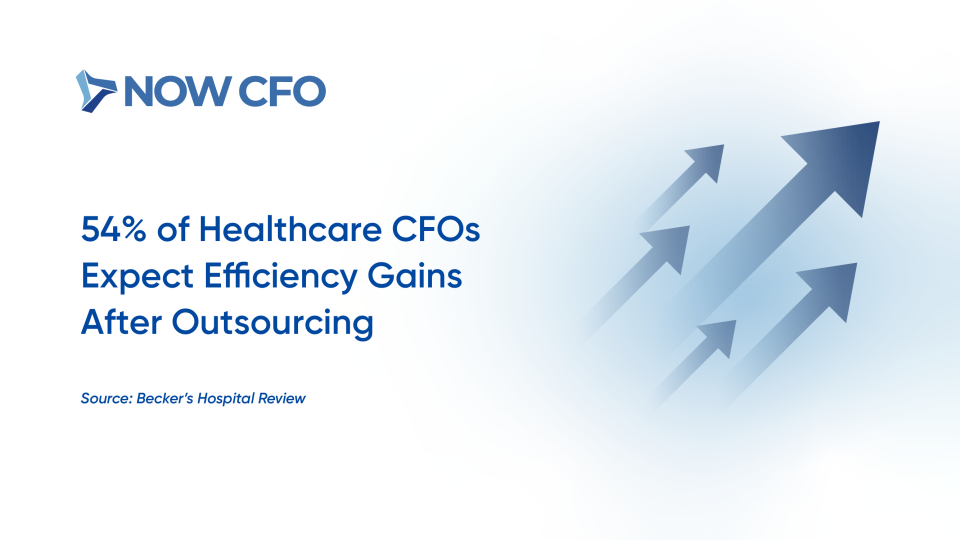
Over half (54 percent) of healthcare CFOs believe outsourcing non-core financial functions will drive significant efficiency improvements. In an environment marked by shrinking reimbursements and rising regulatory complexity, fractional CFOs bring process‐optimization expertise and technology.
Client hospitals and physician groups engaging fractional CFOs often see faster billing cycles, reduced denial rates, and more real-time financial visibility, enabling them to reinvest savings into patient care and innovation.
Source: Becker’s Hospital Review
CFO Requests Increased by 51% Since 2020 for C-Suite Requests
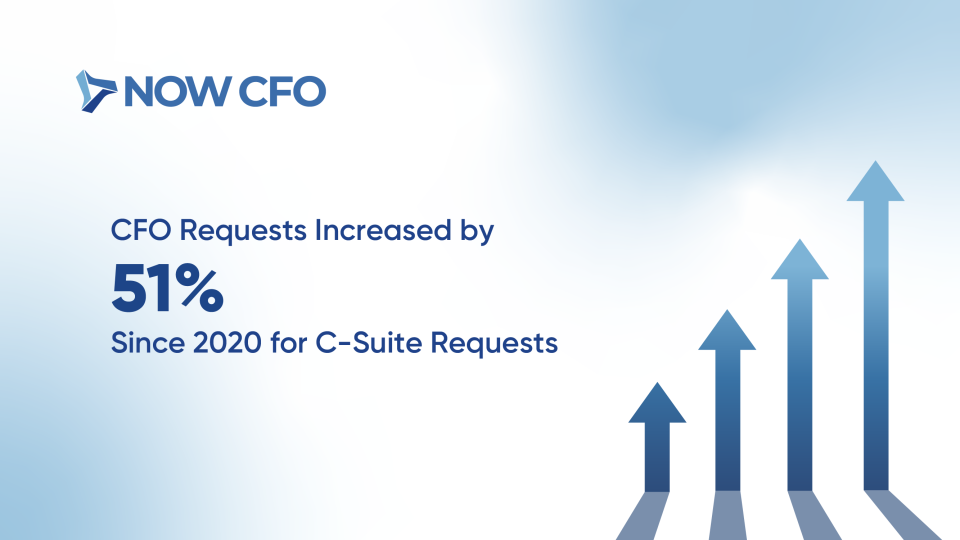
Demand for interim and fractional CFO roles has surged, up a staggering 310 percent compared to 2020. Out of which, 51% of C-suite requests are for CFO roles.
CFOs provide deep, project-based expertise to guide critical financial decisions, whether negotiating debt facilities, setting up financial controls, or leading carve-outs, without the cost or lag associated with permanent executive searches.
Source: Business Talent Group
“Fractional CFO” Google Searches Soar Since 2022
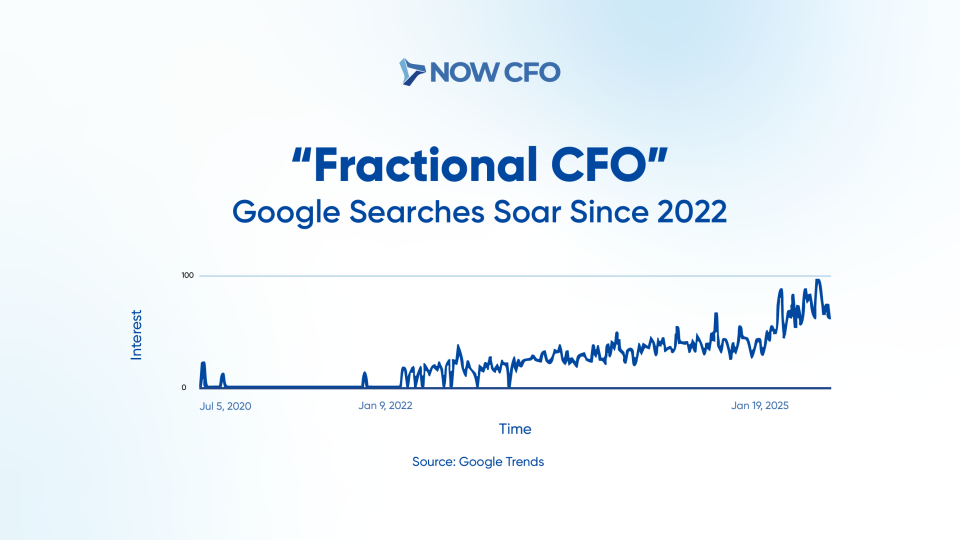
Online search interest for fractional CFO in the U.S. has climbed dramatically since 2022, indicating rising market awareness and consideration among business leaders. As founders and finance teams explore cost-effective leadership models, a surge in search volume signals that fractional CFO services make it a mainstream option.
This digital footprint often represents the first step in the buyer’s journey, researching flexible CFO alternatives, which fractional CFO providers can capture through targeted content, thought leadership, and SEO-optimized resources.
Source: Google Trends
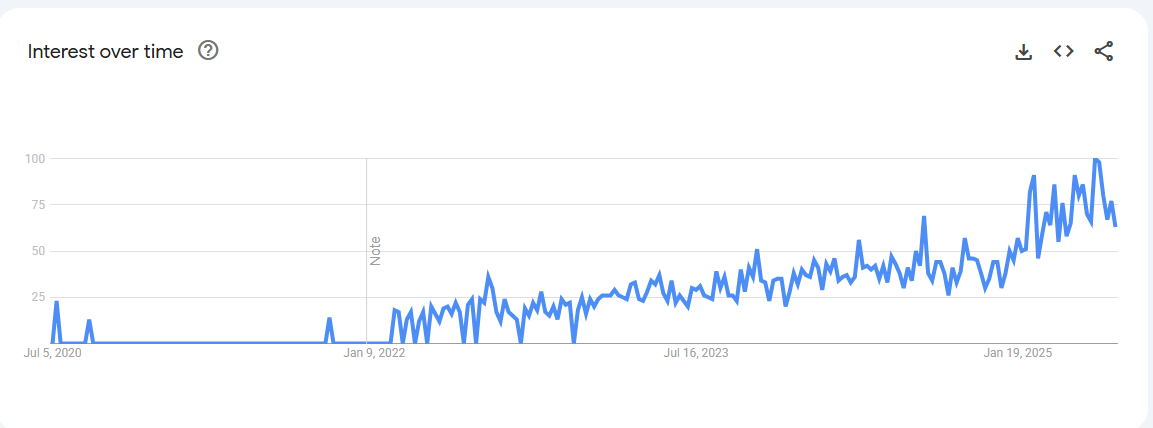
Soaring Market Demand for Fractional CFOs
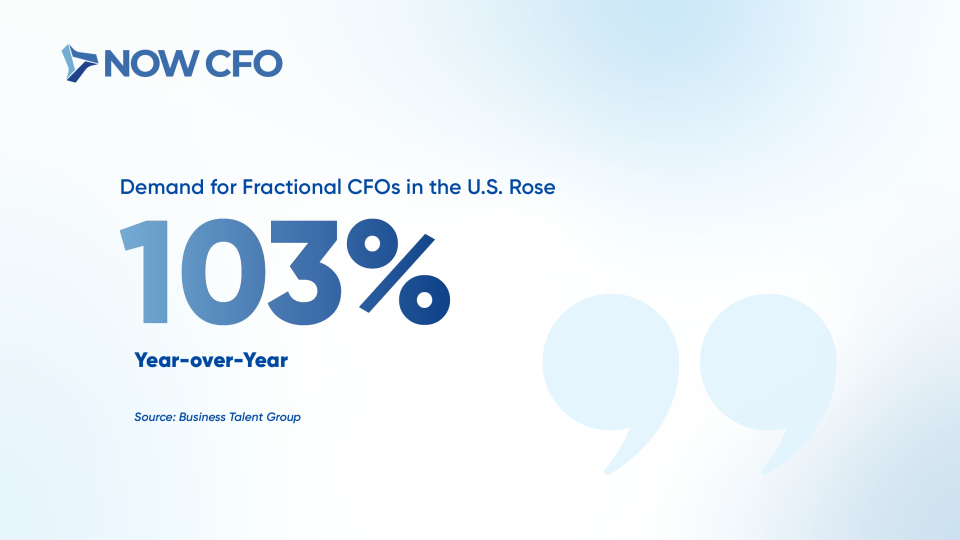
The demand for fractional CFOs in the U.S. has skyrocketed, with a staggering 103% year-over-year increase. These trends reflect a significant shift in how businesses, especially startups and growth-stage companies, approach financial leadership.
Instead of committing to the high fixed costs of full-time CFOs, companies are turning to fractional solutions that deliver flexibility without sacrificing strategic expertise.
This surge in demand proves that more businesses are recognizing the benefits of experienced, project-based financial leadership. With fractional CFOs, companies can access tailored financial strategies, budget oversight, and forecasting support exactly when needed.
Source: Business Talent Group
Conclusion
The above statistics paint a clear picture: the fractional CFO industry fundamentally changes how businesses access high-level financial leadership, whether you’re a startup looking to stretch your runway, an established SMB aiming to optimize cash flow, or a healthcare organization seeking operational expertise.
Don’t let cost or headcount constraints hold back your financial strategy. Contact NOW CFO today to learn how our seasoned fractional CFOs can help you navigate growth, improve margins, and achieve your business goals.
FAQs
What is a Fractional CFO and How is it Different from a Full-time CFO?
A fractional CFO is a senior financial executive engaged on a part-time, project, or interim basis. Unlike a full-time CFO on your payroll 40 hours a week, a fractional CFO provides strategic guidance only when needed.
How Much Can Businesses Save by Hiring a Fractional CFO?
On average, businesses save up to 30% to 40% on CFO costs compared to a full-time hire. Savings come from reduced salary and benefits expenses, no long-term employment commitments, and the ability to scale hours based on project needs.
Which Industries Benefit the Most from Fractional CFO Services?
While fractional CFOs add value across many sectors, technology startups and healthcare organizations are among the largest adopters. Tech companies leverage their insights for fundraising, unit economics modeling, and rapid scaling, whereas healthcare CFOs use them to optimize revenue-cycle management and compliance.
How do Fractional CFOs Improve Cash Flow Management?
Fractional CFOs implement robust forecasting models and real-time financial dashboards, enabling proactive working-capital oversight. Within the first six months, clients often see double-digit improvements in cash-flow visibility and cycle times.
What is the Future Outlook for the Fractional CFO Industry?
Industry forecasts predict a continued upward trend: financial executives expect demand for fractional CFOs to increase over the next five years. Key drivers include growing acceptance of remote collaboration tools, tighter cost controls, and the need for specialized expertise during economic uncertainty.
Ensuring operational efficiency and financial integrity is no longer optional for SMEs; it’s essential. At the heart of these efforts lies the role of internal controls, a system of policies, processes, and monitoring tools designed to safeguard assets, promote transparency, and prevent costly errors or fraud.
For business owners, CFOs, and entrepreneurs, understanding and implementing effective internal controls is key to building a resilient organization that can withstand evolving risks. 69% of board members rank internal controls among their top three priorities for organizational resilience.
What are Internal Controls and Why are They Important?
Strong governance begins with a clear grasp of the role of internal controls today. By defining what these controls entail and examining their tangible effects, organizations can appreciate how internal controls for business operations underpin financial integrity and risk mitigation.
Defining Internal Controls in Business
Internal controls are the policies, procedures, and mechanisms that an organization puts in place to ensure the accuracy of its financial reporting, safeguard assets, and promote operational efficiency. They establish standardized workflows that deter errors and detect discrepancies.
These controls form the backbone of a company’s internal control systems, guiding employees through predefined checks and balances. A robust control environment begins with management’s commitment: setting a “tone at the top” that emphasizes accountability and ethical behavior.
The Impact of Internal Controls on Business Operations
Internal controls extend beyond mere compliance; they reshape an organization’s daily operations. When controls align with strategic objectives, they enhance transparency and instill stakeholder confidence. Consider these key operational benefits:
Automated reconciliations and dual-approval processes reduce errors in ledgers and financial statements.
Enhanced Risk Management
- Proactive risk assessments identify potential vulnerabilities before they materialize.
- Embedding risk checkpoints into workflows helps organizations adapt controls as business needs evolve.
Streamlined Compliance
- Standardized control activities ensure adherence to regulations such as Sarbanes–Oxley and industry-specific mandates.
- Continuous monitoring simplifies audit processes, reducing compliance costs.
Operational Transparency and Accountability
- Clear documentation of control procedures promotes employee accountability and reduces conflicts of interest.
- Real-time dashboards give executives visibility into transaction flows, supporting data-driven decision-making.
Fraud Prevention and Detection
- Detective controls: such as periodic transaction reviews—catch irregularities quickly.
- Preventive measures, like mandatory vacations for finance staff, deter collusion.
Key Functions of Internal Controls in Business
Examining their core functions is vital to appreciate the role of internal controls. These functions, from ensuring financial accuracy with internal controls to fraud prevention, form a cohesive system that underpins every facet of operations.
Financial Accuracy and Integrity
Accurate financial reporting begins with well-designed controls that verify transaction data at each step. The role of internal controls mandates dual approvals, systematic reconciliations, and clear audit trails to catch errors before they affect the general ledger.
By enforcing standardized documentation, organizations can consistently produce reliable financial statements. Effective controls also facilitate timely adjustments, reducing the need for disruptive restatements.
Fraud Prevention and Detection
To counteract fraudulent schemes, organizations must integrate both preventive and detective measures. Internal controls prescribe proactive strategies to deter misconduct. Once deployed, detective controls such as transaction monitoring and exception reporting identify anomalies quickly, enabling swift investigation.
- Preventive Controls: Segregate authorization and record-keeping duties to eliminate single-point vulnerabilities. Enforce mandatory leave policies to reveal hidden collusion.
- Detective Controls: Implement real-time transaction reviews to spot irregular patterns. Use data analytics to flag outliers and reconcile discrepancies.
Risk Management and Mitigation
Robust risk management transforms potential threats into manageable scenarios. Internal controls integrate risk assessments into daily workflows, ensuring emerging risks receive timely attention.
- Risk Assessment: Regularly identify and rank risks by likelihood and impact, guiding control prioritization.
- Risk Response: Develop action plans; avoidance, transfer, or acceptance, aligned with organizational risk appetite.
- Ongoing Monitoring: Review control effectiveness and adapt to new risk landscapes.
Regulatory Compliance and Governance
Meeting regulatory mandates demands systematic control frameworks. Internal controls ensure policies reflect current laws and that every transaction meets established criteria. Continuous governance reviews keep the organization audit-ready.
- Policy Enforcement: Embed regulatory requirements into workflows and approval matrices.
- Documentation & Reporting: Maintain audit-quality records to satisfy regulators and external auditors.
- Governance Reviews: Conduct periodic board-level oversight to validate compliance posture.
Protecting Business Assets and Resources
Safeguarding organizational assets relies on layered control defenses. Internal controls mandate physical safeguards (e.g., access controls, CCTV) and digital protections (e.g., restricted permissions) to prevent asset loss.
Companies often deploy:
- Physical Controls: Secure storage, surveillance, and inventory counts.
- Digital Controls: Role-based access, encryption, and cybersecurity protocols.
- Periodic Reviews: Asset audits and surprise inspections to detect misappropriation.
How Internal Controls Strengthen Business Operations
Building on the core functions, the role of internal controls extends into tangible operational enhancements that drive efficiency and accuracy across the organization. Below, we explore how these internal controls for business operations translate into real-world improvements.
Streamlining Financial Reporting and Auditing
Well-designed controls expedite the close process and improve audit readiness. Organizations reduce manual effort and accelerate month-end close by automating reconciliations and embedding approval workflows.
These measures also ensure auditors have direct access to accurate, traceable records, reducing audit queries and facilitating smoother external reviews. When finance teams leverage standardized templates and digital checklists, they eliminate redundancies and focus on high-value analysis rather than data gathering.
Enhancing Decision-Making with Reliable Data
Accurate, timely data is the lifeblood of executive decision-making. Internal controls ensure that performance metrics and financial KPIs derive from validated sources. Controls like automated data feeds, access restrictions, and exception reporting guarantee that leadership reviews only high-integrity information.
With reliable dashboards updated in real-time, CEOs and CFOs can identify trends and respond swiftly to emerging challenges. The National Credit Union Administration provides quarterly Financial Performance Reports within 6–8 weeks of data submission, enabling board members to benchmark performance promptly.
By reinforcing governance and risk management, these controls transform raw numbers into strategic insights.
Ensuring Accountability and Transparency in Operations
The role of internal controls integrates clear ownership and oversight into every process to foster a culture of responsibility.
- Ownership Assignment: Designate responsible individuals for each control activity.
- Documented Workflows: Maintain version-controlled policies and log all approvals.
- Independent Oversight: Conduct periodic, unannounced reviews to verify adherence.
Safeguarding Against Fraud and Errors
Preventing and detecting misstatements requires multi-layered defenses. Internal controls prescribe both preventive measures and detective controls, such as exception reports and variance analyses.
Controls accelerate investigation and resolution by automatically flagging anomalies (e.g., duplicate payments or unusual invoice amounts). In addition, periodic data analytics reviews identify emerging fraud patterns, enabling proactive risk mitigation.
Together, these controls uphold financial accuracy with internal controls and protect organizational assets from intentional and accidental losses.
Reducing Operational Inefficiencies
The effective role of internal controls streamlines workflows by removing redundant tasks and standardizing procedures. Controls like automated invoice matching and electronic approvals replace manual bottlenecks, cutting process cycle times.
By mapping end-to-end processes and embedding controls at key junctures, businesses eliminate handoffs that cause delays. Continuous monitoring dashboards then highlight slow points, guiding targeted improvements.
Best Practices for Implementing Effective Internal Controls
A mature control environment turns theory into action. The following seven best practices translate the role of internal controls into daily habits that fortify operations and inspire stakeholder confidence in your organization’s governance framework.
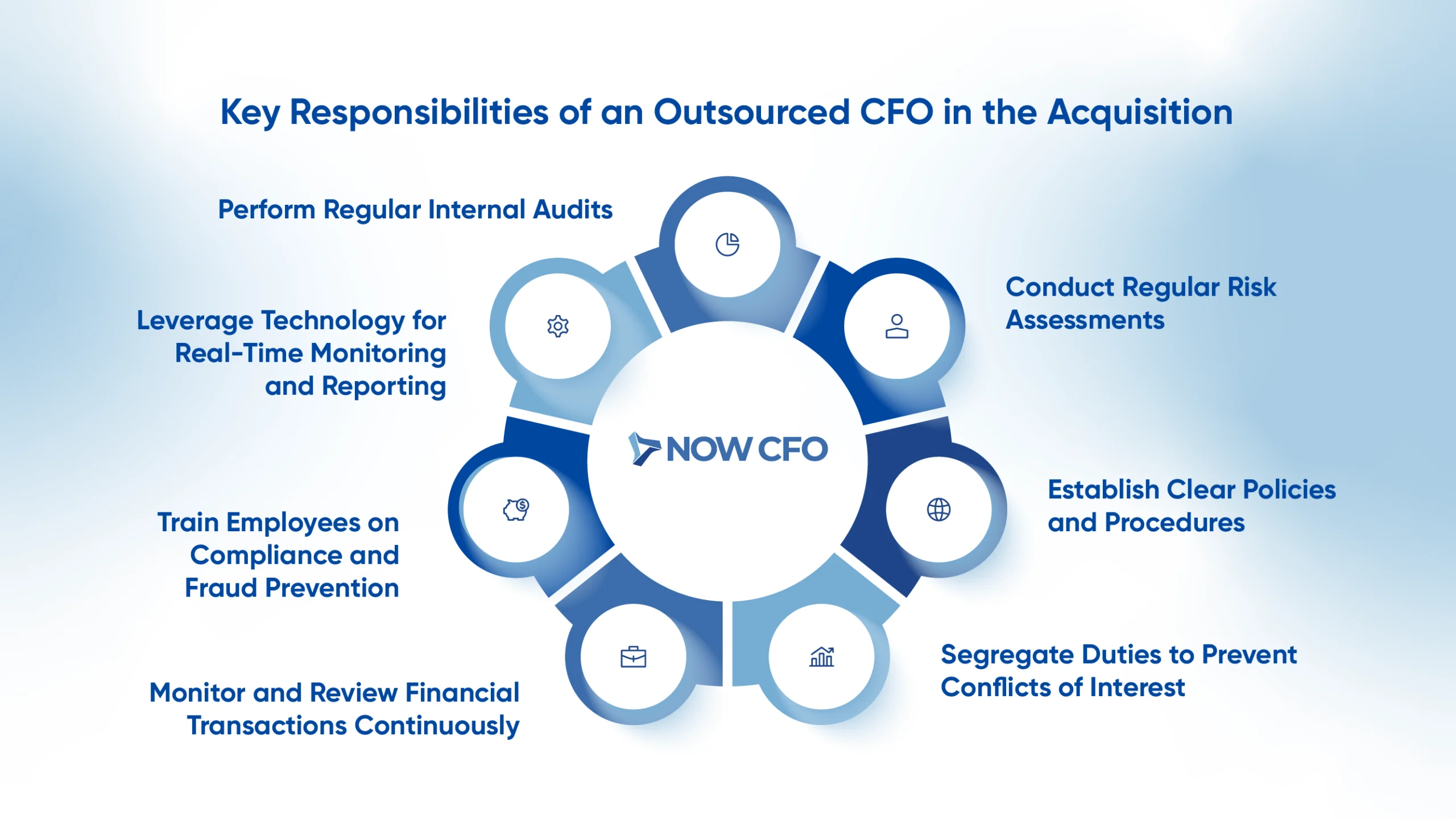
1. Conduct Regular Risk Assessments
Mapping threats is the first step toward mitigation. Schedule enterprise-wide risk assessments annually, scoring each risk by probability and impact. Engage cross-functional leaders to surface emerging issues and update the risk register immediately after material changes.
Pair qualitative interviews with quantitative data (e.g., variance analyses) to avoid blind spots. Consistent risk reviews align internal controls with strategy and support internal control systems for regulatory compliance by ensuring controls adapt as the business evolves.
2. Establish Clear Policies and Procedures
Policies transform intent into repeatable action. Draft concise, jargon-free process narratives that specify who performs each task, the documentation required, and approval thresholds. Publish these procedures in a centralized, version-controlled repository so employees always consult the latest guidance.
When rules conflict, they escalate to a designated policy steward for rapid clarification. Clarity reduces interpretation errors, which is one of the key best practices for implementing internal controls principle.
3. Segregate Duties to Prevent Conflicts of Interest
To block single-point manipulation, separate authorization, custody, and recording activities. Assign purchase approvals to budget owners, goods receipt to warehouse staff, and invoice entry to accounts payable. Follow up with periodic overlap checks:
- Access-Review Reports: Verify that no user retains incompatible roles.
- Rotation & Mandatory Leave: Force process hand-offs that expose concealed schemes.
- Exception Dashboards: Highlight transactions cleared outside typical paths.
4. Monitor and Review Financial Transactions Continuously
Real-time dashboards convert raw activity into actionable warnings. Configure rules that flag duplicate vendors, round-dollar journal entries, and payments above tolerance limits. Daily exception queues let controllers investigate anomalies long before month-end.
5. Train Employees on Compliance and Fraud Prevention
People are the last and often strongest line of defense. Use blended learning that couples micro-videos with scenario drills, then reinforce lessons through quarterly refreshers.
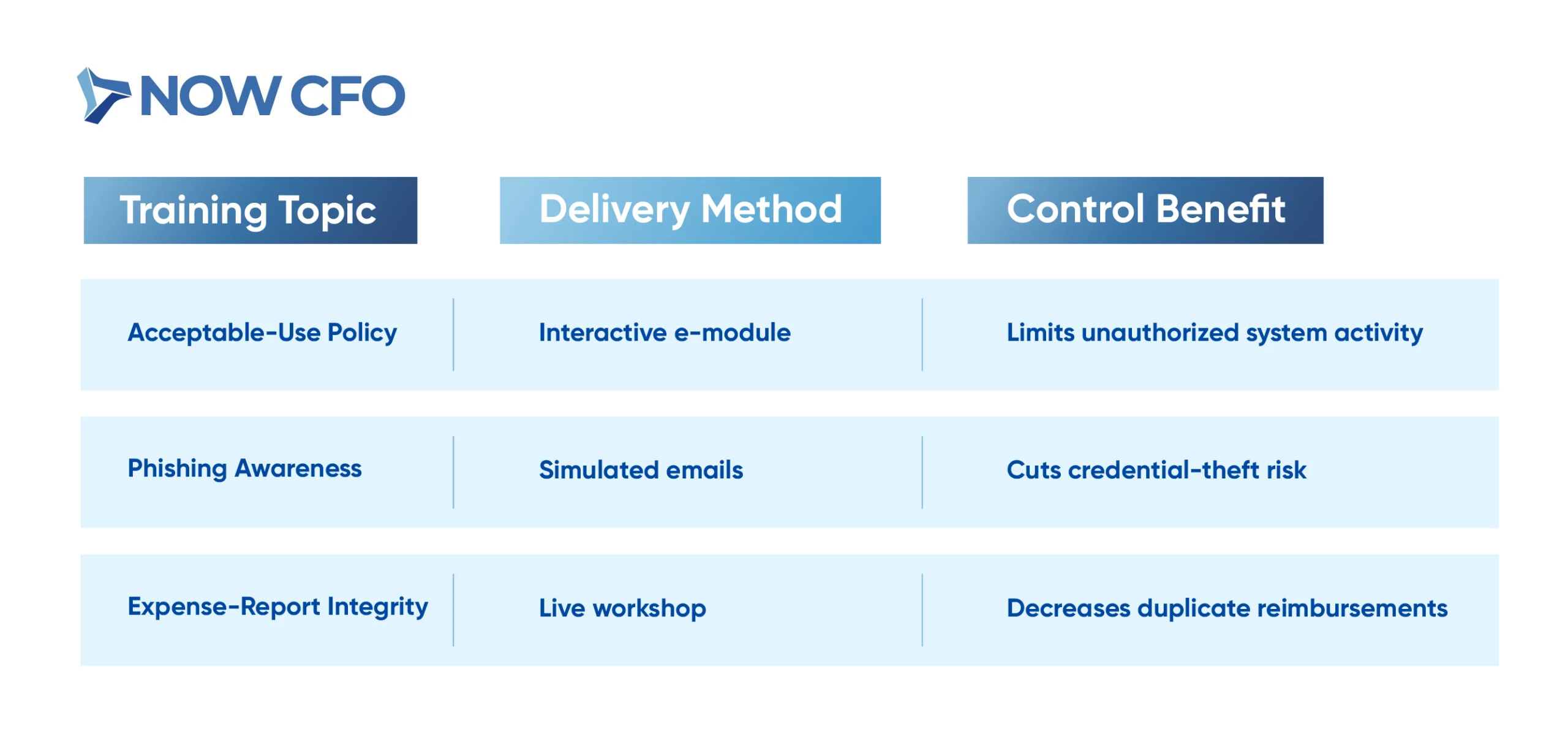
Institutionalizing learning embeds fraud prevention and internal controls into daily routines.
6. Leverage Technology for Real-Time Monitoring and Reporting
Automation magnifies oversight reach without ballooning headcount. Deploy cloud-based ERPs with built-in control libraries, robotic process automation for three-way-match invoices, and AI anomaly detection that scores transactions by deviation likelihood.
Configure push alerts so executives receive high-risk exceptions instantly. Technology accelerates remediation and supplies immutable logs that satisfy auditors and boosts internal control systems resilience.
7. Perform Regular Internal Audits
Internal audit provides an independent pulse-check on control fitness. Build a rolling audit plan tied to risk rankings, reserving extra hours for volatile processes like revenue recognition or IT change management. Each engagement should:
- Validate control design against objectives.
- Test operating effectiveness via sampling and walkthroughs.
- Recommend pragmatic fixes with clear owners and timelines.
Track findings in a central repository and report quarterly closure rates to the audit committee.
The Role of CFOs in Strengthening Internal Controls
Building on structured best practices, the role of CFOs in strengthening internal controls centers on leadership, strategy alignment, and cross-functional collaboration.
Leading the Design and Implementation of Internal Controls
As chief governance architect, the CFO defines control frameworks, assigns ownership, and oversees rollout across finance and operations. They draft control matrices mapping risks to activities, ensuring every material process has corresponding checks and balances.
CFOs also champion pilot programs to validate workflows before enterprise-wide deployment. Training sessions and regular town halls reinforce the role of internal controls as a strategic priority.
Ensuring Internal Controls Align with Business Strategy
CFOs translate corporate goals into control requirements, embedding financial and operational KPIs within control objectives. They review strategic plans to identify new risk areas, then modify control scopes accordingly. This alignment makes controls enablers rather than roadblocks, supporting agile decision-making.
Using Internal Controls to Support Financial Planning
In financial planning cycles, CFOs leverage controls to validate forecast inputs and scenario analyses. They integrate control checkpoints into budgeting tools, automatically flagging variances beyond tolerance thresholds. This ensures data integrity, instilling confidence in rolling forecasts and long-range models.
During planning workshops, CFOs review control logs from prior periods to refine assumptions, demonstrating governance and risk management in action. By embedding controls into every budgeting stage, they elevate planning from a back-office task to a strategic dialogue.
Collaborating With Other Departments to Maintain Control Integrity
CFOs cultivate partnerships with IT, operations, and HR teams to keep controls robust as business processes evolve. They establish cross-departmental control forums to review system changes, policy updates, and emerging risks.
For example, collaborating with IT ensures that user-access controls mirror procedural policies, while working with HR aligns payroll controls with headcount workflows. Regular joint audits and shared dashboards foster transparency, anchoring risk management through internal controls across functions.
Common Challenges in Internal Control Implementation and How to Overcome Them
Internal controls often stall when practical obstacles arise. Below, we explore four common hurdles and offer targeted strategies to overcome them.
Lack of Employee Buy-In for Internal Controls
Engaging staff is critical for effective internal control systems. When employees view controls as burdensome, compliance drops and errors rise.
- Communicate Purpose: Hold workshops explaining how controls protect the company and individual careers.
- Solicit Feedback: Involve frontline teams in control design to foster ownership and ensure procedures fit real workflows.
- Recognize Compliance: Tie control adherence to performance evaluations and reward contributions to risk mitigation.
Overly Complex Control Systems Leading to Operational Inefficiencies
When controls proliferate unchecked, they can bog down processes and frustrate users.
- Simplify Processes: Map end-to-end workflows, then consolidate redundant approvals and automate routine checks (e.g., three-way invoice matching).
- Tier Controls by Risk: Apply stringent checks only where risk warrants—low-risk transactions receive lighter oversight.
- Regular Rationalization: Quarterly reviews eliminate obsolete controls and streamline decision paths.
Inadequate Monitoring of Control Effectiveness
Even well-designed controls fail without ongoing oversight. Organizations must build continuous monitoring into daily operations. Effective monitoring blends automated analytics with periodic manual reviews to validate system performance.
Failure to Adapt Controls to Changing Business Needs
Static controls become obsolete as strategies, technologies, and regulations evolve. To stay current:
- CFOs should reintegrate risk assessments into strategic planning cycles.
- Deploy change-management forums where IT, finance, and operations stakeholders review control impacts before system upgrades.
How Internal Controls Contribute to Risk Management
A key aspect of internal control is its ability to manage business risks proactively. By embedding structured controls into operations, organizations can detect threats early, prevent fraud, and ensure compliance while enhancing accountability.
Identifying and Addressing Potential Risks Early
Early risk detection is essential for effective governance and risk management. Organizations that integrate risk assessments into daily processes can respond before threats escalate.
| Risk Category | Potential Threat | Control Measure |
|---|---|---|
| Financial | Revenue misstatements | Reconciliations, segregation of duties |
| Operational | Supply chain disruptions | Vendor audits, contingency planning |
| Cybersecurity | Data breaches | Access controls, regular system updates |
| Compliance | Regulatory violations | Policy reviews, automated compliance checks |
Establishing Controls to Prevent and Detect Fraud
Fraud undermines financial integrity, erodes trust, and exposes organizations to reputational damage. Robust internal controls for business operations serve as both deterrents and detection mechanisms.
Preventive controls limit opportunities for fraudulent behavior. Meanwhile, detective controls, including exception reporting and transaction monitoring, expose irregularities in real-time.
Ensuring Compliance with Regulatory Requirements
Effective internal control systems for regulatory compliance are vital to avoid penalties and maintain operational licenses. Controls must translate complex regulatory frameworks into daily tasks. Automated systems flag non-compliant activities, while periodic reviews ensure processes reflect current regulations.
In fiscal year 2024, the U.S. Securities and Exchange Commission filed 583 enforcement actions and obtained a record $8.2 billion in financial remedies. This comprised $6.1 billion in disgorgement and prejudgment interest and $2.1 billion in civil penalties, marking the highest recovery in SEC history.
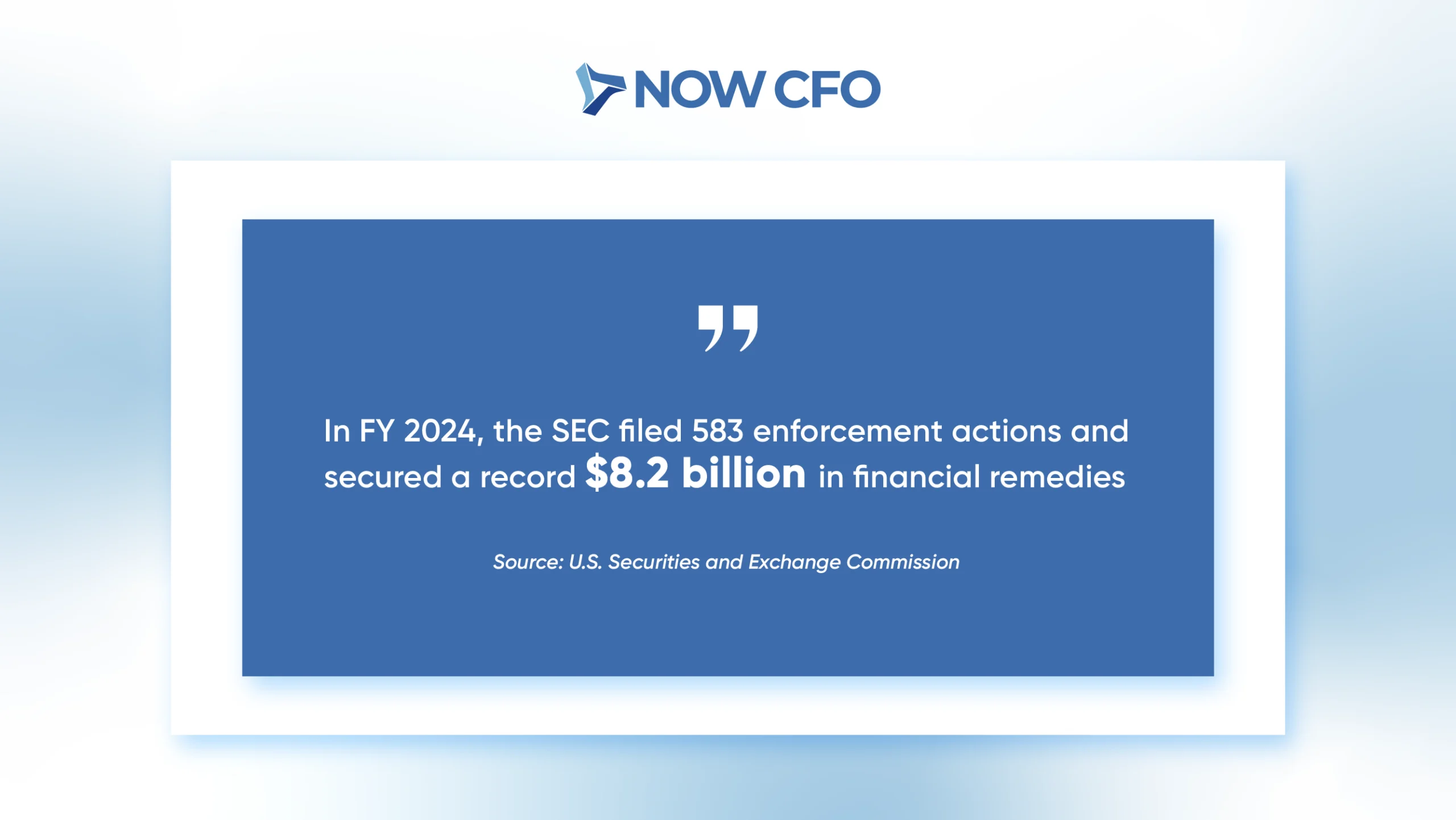
Source: U.S. Securities and Exchange Commission
Enhancing Accountability Across Business Functions
Accountability is the foundation of effective risk management. Through internal controls, businesses ensure that responsibility for risks and controls is distributed across all departments, not just finance.
Key accountability strategies include:
- Role Clarity: Clearly defining control of ownership within each department.
- Integrated Dashboards: Providing executives with cross-functional control status updates.
- Cross-Department Reviews: Conducting joint audits to validate control performance across functions.
Conclusion: Strengthening Business Operations with Effective Internal Controls
Building a strong control environment is one of the most reliable ways to drive operational efficiency and protect your organization. For CFOs, executives, and business owners, investing in robust internal controls means safeguarding your reputation, minimizing fraud risks, and building stakeholder trust.
If your business is ready to take the next step toward operational excellence and financial integrity, NOW CFO is here to help. Schedule a complimentary consultation with our financial experts and request a personalized internal controls assessment. Let’s work together to build your internal control systems for success and resilience.
Acquisitions are the ultimate pathway for growth, expansion, and increased market share. Yet, while managing acquisitions presents significant opportunities, they also introduce complex financial, operational, and regulatory risks.
Research from the University of Virginia reveals that 65% to 85 % of M&A fail to create shareholder value, with nearly a quarter of deals actively destroying value. Without the right financial leadership, these risks can quickly derail even the most promising deal. That’s where an outsourced CFO becomes a game-changer.
Why an Outsourced CFO Is Essential for Managing Acquisitions
When navigating the complexities of mergers, businesses increasingly turn to an outsourced CFO to bridge resource gaps and accelerate deal success. By leveraging specialized financial acumen without the delay of hiring a full-time executive, companies gain critical momentum in planning and execution.
Expertise in Financial Planning and Analysis
An outsourced CFO brings deep proficiency in building robust financial models and stress-testing scenarios, capabilities that many growing companies lack internally. They design pro forma statements that factor in synergies, integration costs, and revenue ramp-ups, ensuring acquirers don’t overpay.
Every year, U.S. firms invest over $2 trillion in acquisitions, yet 70–90 percent of them fail due to flawed assumptions and planning.
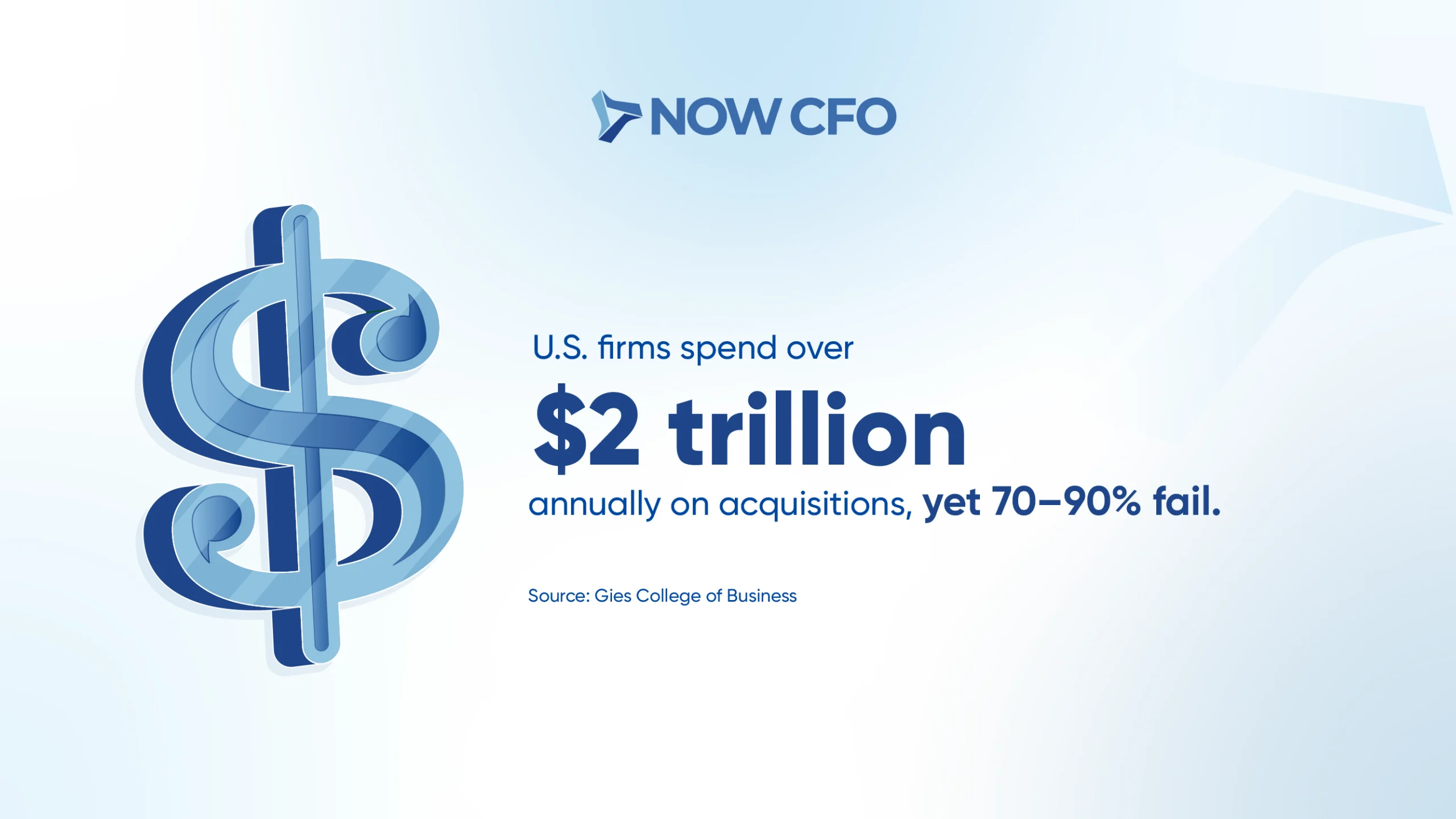
Ability to Provide Objective, Unbiased Financial Insights
Engaging a fractional CFO ensures decisions are grounded in data, not internal politics or legacy biases.
- Independent Valuations: They assess targets without revenue cannibalization fears, delivering fair enterprise-value estimates.
- Clear Performance Metrics: By establishing KPIs, including EBITDA accretion, working-capital targets, and ROI thresholds, a fractional CFO highlights deal viability.
- Unvarnished Reporting: Their third-party stance surfaces hidden liabilities that internal teams might downplay.
Cost-Effective Solution Compared to In-House CFOs
For many SMEs, recruiting a full-time CFO can cost over $200,000 annually (salary plus benefits). Instead, outsourcing provides access to senior expertise at a fraction of that:
- Predictable Fees: Monthly retainer models cap costs, allowing firms to budget precisely.
- Avoided Overhead: No recruitment, training, or benefits expenses—your company pays only for hours used.
- Scalable Support: Engage additional project-based resources (tax, treasury, audit) without headcount approvals.
Learn More: Strategic role of a fractional CFO
Key Responsibilities of an Outsourced CFO in the Acquisition Process
As companies embark on mergers and acquisitions, they undergo rigorous evaluations, strategic planning, and regulatory scrutiny. An outsourced CFO acquisition management orchestrates each stage to guarantee effective integration and robust financial risk management.
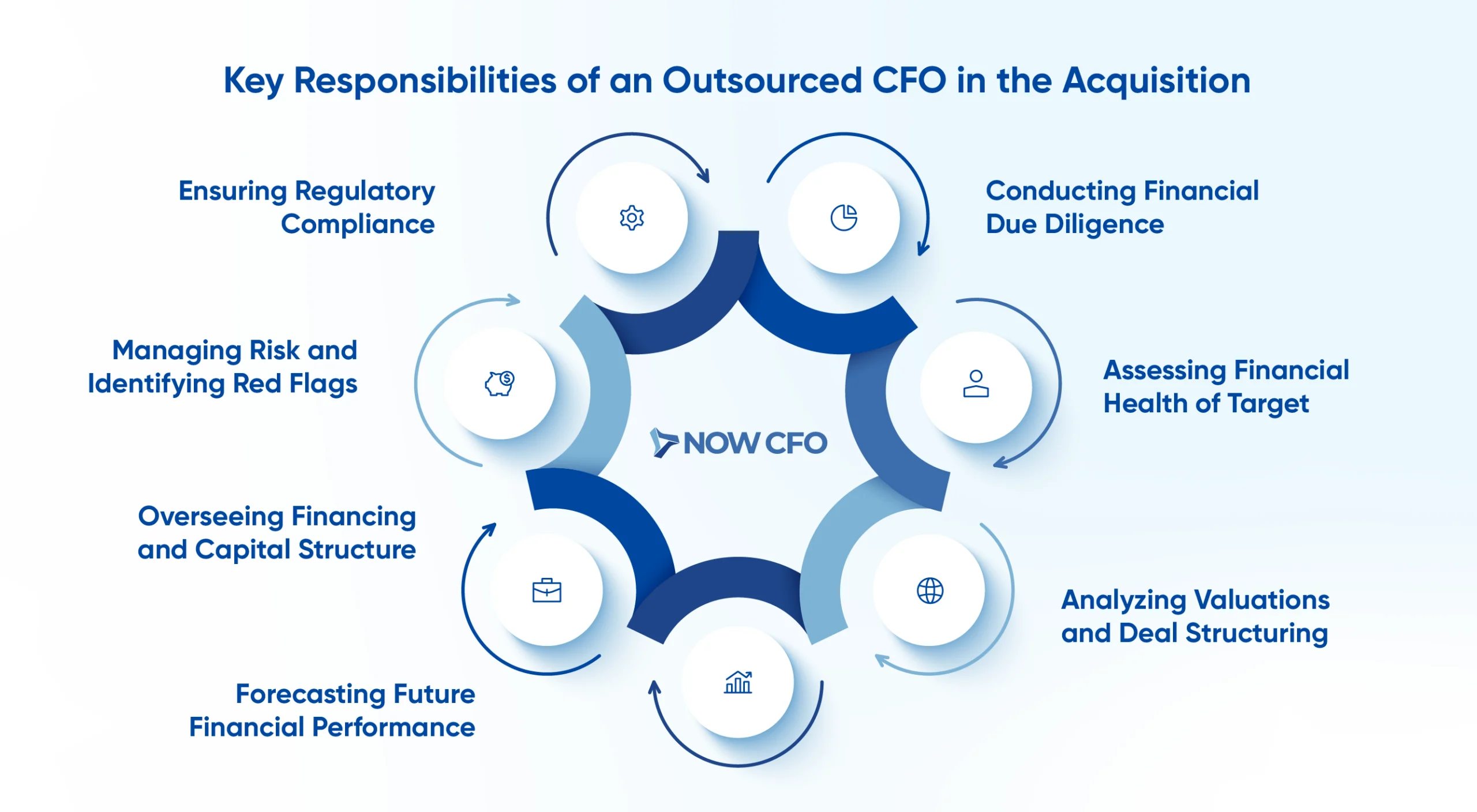
1. Conducting Financial Due Diligence
An outsourced CFO leads comprehensive financial due diligence, examining historical financial statements, cash flows, and debt obligations. They reconcile revenue recognition discrepancies, validate working capital assumptions, and stress-test projections.
By engaging third-party auditors and leveraging digital data rooms, they uncover hidden liabilities, deferred tax exposures, and covenant breaches. They also assess inventory obsolescence and revenue backlog to ensure no material surprises.
2. Assessing Financial Health of Target Companies
An outsourced CFO evaluates the target’s balance sheet, income statements, and cash flow metrics to assess liquidity, leverage, and operational efficiency. They calculate key ratios to benchmark against industry standards.
They identify potential cash flow bottlenecks by examining aging receivables, inventory turnover, and working capital trends. Additionally, analysis of off-balance-sheet items, pension obligations, and contingent liabilities uncover hidden strains.
This assessment of financial health guides deals with pricing and informs post-acquisition integration strategies, ensuring that anticipated synergies are realistic and sustainable. Scrutiny of financial stability at the outset reduces surprises and bolsters confidence in acquisition outcomes.
3. Analyzing Valuations and Deal Structuring
After evaluating target viability, an outsourced CFO advances to analyzing valuations and deal structuring within the M&A framework, ensuring deal terms align with strategic objectives and value drivers.
- Enterprise Value Calculation: Employ comparable-company analysis, precedent transactions, and discounted cash flow models to triangulate fair value.
- Deal Structure Design: Advise on asset vs. stock purchase, earn-outs, contingent payments, tranche structures, and tax-efficient clauses to balance risk and reward.
- Synergy Assessment: Quantify cost and revenue synergies, mapping integration savings to support negotiation levers.
- Deal Economics Modeling: Develop pro forma income statements and balance sheets reflecting financing costs, tax effects, and integration expenses.
- Financing Scenario Planning: Evaluate debt-equity mix, interest rate sensitivity, and covenant impacts to optimize capital structure.
4. Forecasting Future Financial Performance
Building on structured deal terms, the outsourced CFO focuses on forecasting future financial performance, using scenario analysis to validate growth assumptions.
- Revenue Projections: Model base-case, best-case, and worst-case revenue scenarios incorporating market growth and customer retention metrics.
- Cost Forecasting: Forecast operating expenses, integration costs, and synergy realization timelines to predict margin impacts and guide post-acquisition integration budgeting.
- Sensitivity Analysis: Test variances in key drivers, pricing, volume, and input costs, to assess profit volatility.
- Cash Flow Modeling: Simulate free cash flow under different scenarios to inform financing decisions and valuation adjustments.
- Scenario Planning: Incorporate macroeconomic shocks, currency fluctuations, and competitive responses to stress-test forecasts.
5. Overseeing Financing and Capital Structure for the Acquisition
An outsourced CFO designs and manages the optimal capital structure for the acquisition, balancing debt and equity to minimize the cost of capital. They negotiate loan terms, interest rates, maturities, covenants, and explore alternative financing vehicles such as mezzanine debt or private equity tranches.
By modeling leverage ratios and debt-service coverage, they ensure the target can support post-close obligations. They also assess refinancing options and interest-rate hedges to mitigate volatility. They coordinate equity raises, pitch decks, and investor due diligence to secure timely funding and stakeholder alignment.
6. Managing Risk and Identifying Potential Red Flags
An outsourced CFO establishes robust financial risk management in acquisitions to spot deal-breaking issues early. They evaluate credit exposures, operational liabilities, and regulatory contingencies across the target’s business units.
By conducting scenario analysis, they stress-test exposure to market downturns, currency fluctuations, and supply-chain disruptions. Their red-flag checklist identifies anomalies in related-party transactions, off-balance-sheet commitments, and compliance gaps.
7. Ensuring Regulatory Compliance
As compliance demands intensify, an outsourced CFO will ensure regulatory compliance and coordinate all filings and approvals to avoid delays.
They prepare and file regulatory notifications, such as Hart-Scott-Rodino (HSR) submissions, ensuring accuracy and timeliness. Under the HSR Act, parties must wait 30 days (or 15 days for cash tender offers) before closing a transaction.
They interface with antitrust and industry regulators, respond to information requests, and secure necessary waivers. In sectors requiring industry-specific approval, such as healthcare or finance, they maintain thorough documentation and manage audit trails.
Learn More: What does an outsourced CFO do
How an Outsourced CFO Supports Acquisition Integration
When an acquisition closes, an outsourced CFO immediately pivots to unifying disparate financial platforms, which is critical for sustaining value and ensuring smooth integration. Standardizing processes and data flows eliminates reporting gaps and accelerates decision-making. Below, we examine four key integration tasks.
Aligning Financial Systems Post-Acquisition
An outsourced CFO consolidates ERPs, general-ledger platforms, and reporting tools into a single architecture. They map chart-of-accounts differences, reconcile transaction codes, and automate data feeds to prevent manual errors.
Enforcing standardized workflows and controls cuts cycle times and enhances visibility. Through expert financial advisory services, they configure dashboards that deliver real-time KPIs, ensuring leadership bases strategic moves on accurate, timely data.
Managing Cultural and Operational Integration
Successful post-acquisition integration demands more than systems work; it requires blending cultures and aligning operations under unified goals.
- Stakeholder Alignment: The outsourced CFO facilitates workshops to harmonize financial policies, KPIs, and performance incentives across legacy teams.
- Communication Protocols: They establish regular town halls and reporting cadences that bridge geography and hierarchy, reducing anxiety and turnover during transition.
- Operational Playbooks: By documenting best practices from both organizations, they create a hybrid operations manual that accelerates process adoption.
Streamlining Financial Reporting and Governance
With cultures aligned, the outsourced CFO tightens governance by embedding clear reporting standards and controls.
- Pro Forma Compliance: They ensure pro forma statements reflect acquisition effects, as required when acquisitions exceed 50% significance in aggregate under SEC S-X Article 11.
- Policy Consolidation: They merge accounting policies into a singular manual, reducing restatements.
- Governance Framework: They form a cross-functional steering committee that monthly reviews financial results, compliance risks, and audit findings.
Optimizing Cash Flow and Working Capital Post-Acquisition
Post-close, an outsourced CFO refine cash-management practices to free up liquidity for growth. They renegotiate payment terms, centralize treasury functions, and implement cash-forecast models that align with new business cycles.
They shrink DSO and reduce working-capital requirements by deploying automated collections systems and dynamic discounting. They also optimize inventory levels using just-in-time principles, lowering holding costs and risk.
Learn More: Outsourced CFO services for budgeting and forecasting
The Role of an Outsourced CFO in Risk Management During Acquisitions
Proactive risk oversight ensures deal success and protects stakeholder value when navigating acquisitions. Outsourced CFO acquisition strategies embed rigorous controls and analytic frameworks to manage uncertainties and legal demands, leveraging financial risk management best practices.
Identifying and Mitigating Financial Risks
An outsourced CFO spearheads the early identification of deal-threatening financial exposures, then develops mitigation plans:
- Credit and Counterparty Risk: They analyze target receivables aging and supplier concentration to cap exposure.
- Market and Liquidity Risk: By stress-testing cash-flow scenarios, they ensure access to financing under adverse conditions.
- Hidden Balance-Sheet Liabilities: They scrutinize off-balance-sheet leases, pension shortfalls, and contingent litigation reserves.
- Integration Cost Overruns: Tracking actual vs. budgeted integration spend prevents budget leakage.
Managing Uncertainty with Scenario Analysis
To navigate volatile market conditions, an outsourced CFO constructs dynamic models that project outcomes under varied assumptions:
| Scenario Type | Approach | Purpose |
|---|---|---|
| Revenue Sensitivity | Model ±10 to 20% price and volume changes | Gauge EBITDA swings under market fluctuations |
| Cost Variability | Stress-test ±5% raw-material cost scenarios | Assess margin resilience to input cost inflation |
| Financing Stress | Simulate +200 basis point interest-rate hikes | Measure the impact on debt service coverage ratios |
| Synergy Realization | Chart best-, base-, and worst-case synergy capture timelines | Set realistic integration targets and track progress |
Ensuring Compliance with Legal and Regulatory Standards
An outsourced CFO navigates the complex legal landscape, coordinating all mandatory filings and approvals. They manage pre-merger notifications and monitor antitrust thresholds to prevent injunctions.
In regulated industries (e.g., healthcare, financial services), they secure sector-specific signoffs and maintain audit-ready documentation. By embedding compliance checkpoints into project plans, they avert fines and delays that can erode deal value.
Addressing Potential Tax Implications of the Acquisition
An outsourced CFO structures transactions to optimize tax outcomes and avoid post-close surprises. They evaluate asset vs. stock purchase elections, analyzing stepped-up basis impacts and potential depreciation benefits.
Key Benefits of Using an Outsourced CFO for Acquisitions
Businesses reap significant rewards when evaluating mergers and acquisitions strategy by leveraging an outsourced CFO’s specialized expertise. From cost savings to sharper decision-making, these benefits accelerate deal success and safeguard value.
Access to Expert Financial Knowledge Without Full-Time Costs
An outsourced CFO delivers veteran-level acquisition financial planning and analysis, eliminating the expense of a full-time hire. You gain immediate access to advanced modeling, capital-structure expertise, and treasury management best practices.
SMEs increasingly recognize this value: 37 percent of firms outsource at least one financial function to control costs and scale expertise as needed.
Objective Perspective on Financial and Strategic Decisions
An outsourced CFO brings an unbiased, third-party lens to your acquisition integration strategy. They challenge internal assumptions and highlight risks that insiders may overlook.
- Independent Valuations: Use market-based multiples and precedent transactions analyses to set fair purchase prices.
- KPI Alignment: To objectively track success, define clear targets; such as post-acquisition EBITDA growth or working-capital ratios.
- Risk Transparency: Surface contingent liabilities, aggressive revenue recognition practices, or off-balance-sheet exposures.
Improved Efficiency and Speed in the Acquisition Process
By streamlining core processes, an outsourced CFO reduces deal timelines and accelerates post-acquisition integration. They coordinate due diligence, negotiate financing, and secure regulatory approvals in parallel. Consider the Hart-Scott-Rodino (HSR) premerger notification:
| HSR Waiting Type | Standard | Cash Tender Offer / Bankruptcy |
|---|---|---|
| Initial Waiting Period | 30 days | 15 days |
| Second Waiting Period | 30 days | 10 days |
Reduced Risk Through Comprehensive Financial Due Diligence
An outsourced CFO fortifies your deal by executing deep financial due diligence across all business lines. They validate historical cash flows, reconcile balance-sheet discrepancies, and stress-test covenant compliance scenarios.
Their rigorous approach uncovers hidden liabilities and quantifies integration cost overruns.
Smooth Transition During Post-Acquisition Integration
A seamless acquisition hinges on coordinated execution across finance, operations, and culture. An Outsourced CFO orchestrates this transition by:
- Systems Unification: Merging ERPs and reporting platforms under a standardized chart-of-accounts.
- Governance Alignment: Establishing joint steering committees to monitor performance metrics and compliance.
- Cash-Flow Optimization: Centralizing treasury functions and optimizing working-capital cycles for the combined entity.
Steps to Take When Working with an Outsourced CFO on an Acquisition
Clear collaboration steps ensure you harness their expertise effectively. By aligning objectives, due diligence protocols, and integration roadmaps, you set the stage for a successful acquisition.
Establish Clear Acquisition Goals and Objectives
Before diving into numbers, define what success looks like. An outsourced CFO collaborates to:
- Articulate Strategic Rationale: Align the acquisition with growth targets (market share, new capabilities) and document desired outcomes.
- Set Financial Metrics: Agree on KPIs; EBITDA accretion, ROIC thresholds, and payback periods, to measure deal success.
- Define Integration Scope: Specify which functions, geographies, and systems must converge post-close.
Collaborate on Financial Due Diligence and Valuation
With objectives clear, your outsourced CFO leads a structured due diligence process. Together you:
- Standardize Data Requests: Use a secure virtual data room with templates for financial statements, contracts, and forecasts.
- Map Valuation Assumptions: Review comparable-company multiples, precedent transactions, and DCF inputs to ensure alignment on value drivers.
- Coordinate Expert Inputs: Schedule sessions with tax, legal, and operational advisors to validate liabilities, synergies, and integration costs.
Develop a Detailed Post-Acquisition Integration Plan
Effective post-acquisition integration hinges on a phased roadmap. Your outsourced CFO helps draft a plan featuring timelines, owners, and deliverables:
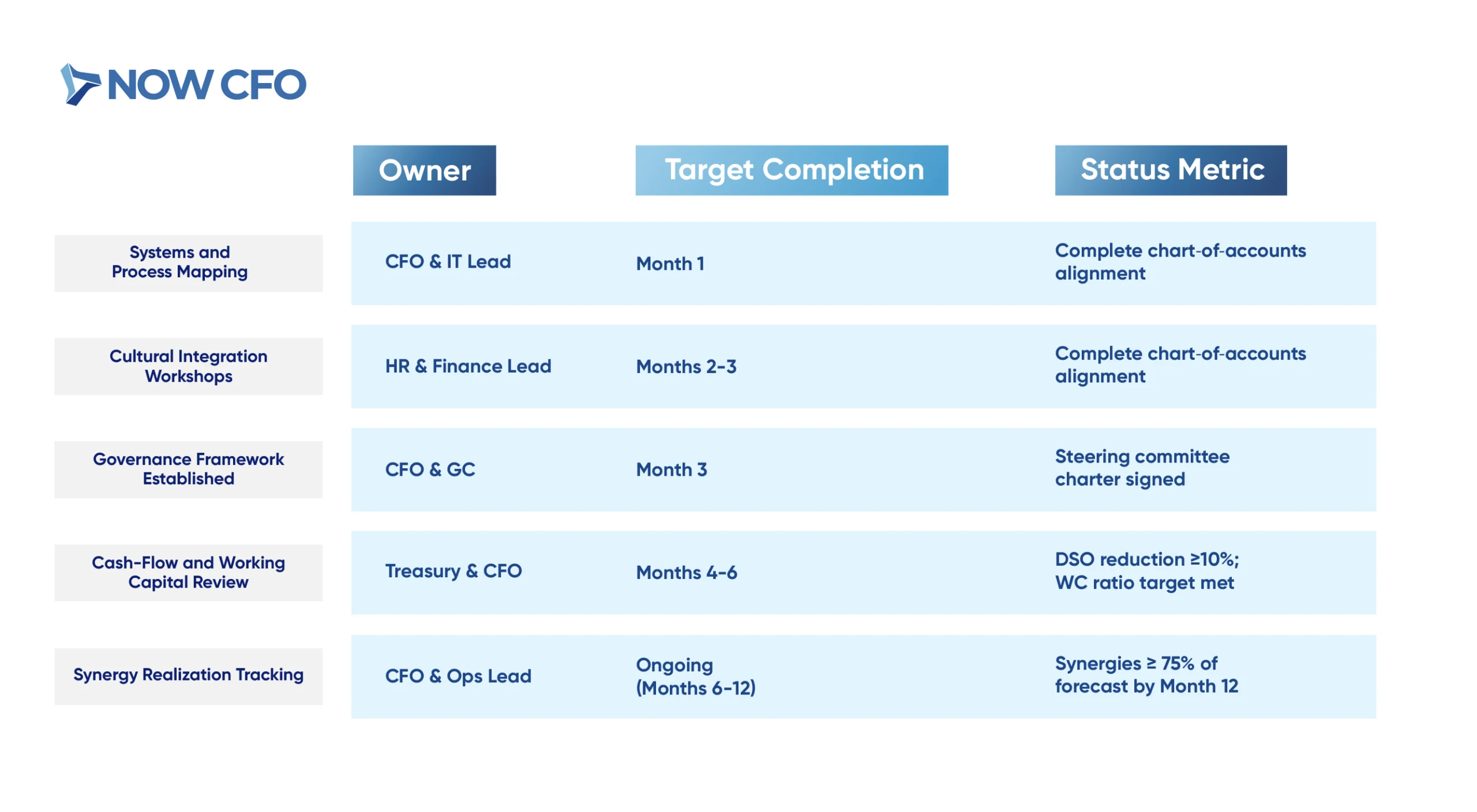
Monitor Financial Performance Post-Acquisition
After close, your outsourced CFO sets up a dashboard to track actual vs. projected performance:
- Regular Reporting Cadence: Weekly cash-flow snapshots and monthly P&L reviews keep stakeholders informed.
- KPI Variance Analysis: Highlight deviations in revenue, margins, and working capital to trigger corrective actions.
- Integration Spend Controls: Compare integration expenses against budgets to prevent cost overruns.
Adjust Acquisition Strategy as Needed Based on Insights
Finally, leverage real-time insights to refine your approach:
- Scenario Re-Forecasting: Revisit base-case, best-case, and worst-case models if market conditions shift.
- Reprioritize Integration Actions: Accelerate high-ROI synergies and delay non-critical tasks to optimize resource allocation.
- Governance Checkpoints: Hold quarterly steering committee meetings to reassess targets and approve strategy pivots.
How to Choose the Right Outsourced CFO for Managing Acquisitions
Selecting the right outsourced CFO can determine the success or failure of your acquisition. Here’s how to choose for seamless acquisition integration and risk mitigation.
Look for Experience in Managing Mergers and Acquisitions
A qualified outsourced CFO should bring extensive hands-on experience leading M&A across industries and deal sizes. They need familiarity with every stage: due diligence, valuation, deal structuring, and integration.
Look for evidence of successful transactions, particularly where the CFO delivered tangible financial outcomes such as EBITDA improvement, working capital optimization, or successful synergy realization.
Assess Their Ability to Conduct Thorough Financial Due Diligence
Once you’ve confirmed acquisition experience, evaluate their due diligence capabilities. An effective outsourced CFO will:
- Audit Financial Statements: Review P&L, balance sheets, and cash flow to validate historical performance.
- Identify Liabilities: Uncover off-balance-sheet risks, tax exposures, and contingent obligations.
- Test Assumptions: Validate revenue, margin, and synergy assumptions against realistic benchmarks.
Verify Their Track Record in Post-Acquisition Integration
A successful acquisition doesn’t end at closing; it depends on seamless post-acquisition integration. When selecting, review their history of:
- Financial Systems Alignment: Unifying ERPs and reporting platforms to ensure data consistency.
- Governance Implementation: Establishing reporting standards, controls, and steering committees.
- Synergy Delivery: Tracking integration KPIs and ensuring cost and revenue synergies materialize.
Ensure Strong Communication and Analytical Skills
Beyond technical expertise, your outsourced CFO must be an effective communicator capable of translating complex financial data into actionable insights. Look for someone who can:
- Facilitate Cross-Functional Alignment: Collaborate with legal, tax, HR, and operations teams.
- Present to Leadership: Articulate the deal risks, value drivers, and strategic trade-offs to the board.
- Deliver Clear Reports: Provide concise, KPI-driven updates that support fast, informed decisions.
Confirm Their Alignment with Your Business’s Acquisition Goals
Finally, ensure your outsourced CFO understands and supports your broader strategic vision. Whether your goals involve market expansion, vertical integration, or financial consolidation, they must align financial models, risk assessments, and integration plans accordingly.
They should ask the right questions and adapt their approach to your industry, size, and resources. A CFO misaligned with your objectives can inadvertently undermine the deal’s value, even with technical competence.
Conclusion: Achieving Successful Acquisitions with an Outsourced CFO
Acquisitions are among the most impactful and complex strategic moves a business can make. While they can drive growth and unlock new market opportunities, they require careful financial planning, rigorous due diligence, and seamless post-acquisition integration.
If your company is considering an M&A, NOW CFO offers the fractional financial leadership you need to execute with precision. Schedule a free consultation today and connect with our team for a robust financial strategy.
Financial integrity remains the cornerstone of sustainable growth. Financial compliance and regulation require clear frameworks, rigorous controls, and vigilant oversight to prevent costly errors.
In fiscal year 2023 alone, federal agencies reported $236 billion in improper payments underscoring the magnitude of non-compliance risks. CFOs who understand what financial compliance is, can translate complex mandates into practical workflows, reducing exposure and enhancing regulatory adherence.
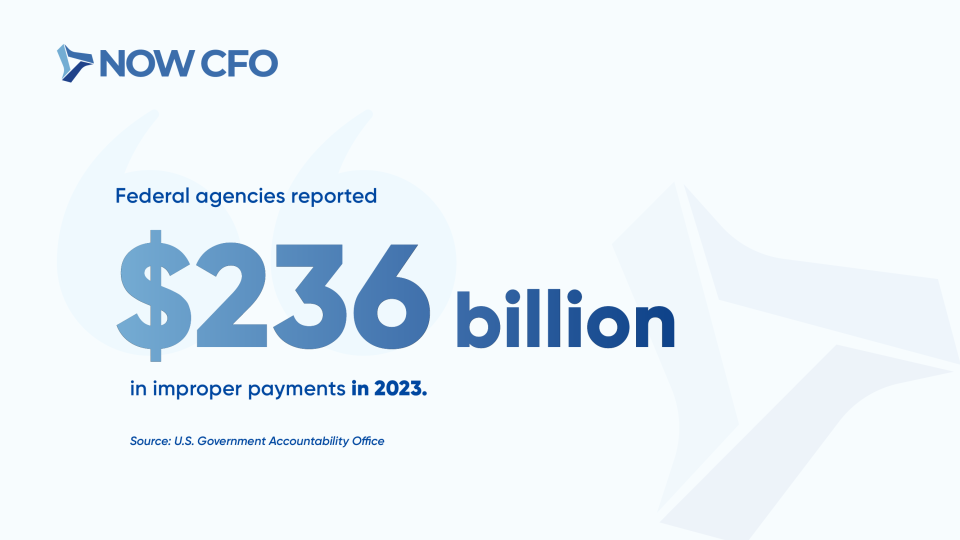
The Importance of Financial Compliance for Business Success
Chief financial officers spearhead compliance and regulation to embed transparency and trust. Understanding financial compliance empowers teams to align policies with regulatory frameworks.
Defining Financial Compliance and its Role in Business
Financial compliance encompasses the policies, processes, and internal controls that ensure an organization meets statutory and regulatory requirements. By codifying procedures, CFOs provide clarity on responsibilities, streamlining audit trails, enabling accurate disclosure, and fostering a culture of accountability.
This framework underpins reliable financial statements and instills confidence in investors and regulators alike.
The Impact of Regulatory Non-Compliance on Business Health
Failing to comply has severe consequences:
- Elevated Costs: Firms with fewer than 20 employees bear an annual regulatory burden of $6,975 per employee, nearly 60% more than those with over 500 staff.
- Disproportionate Strain: Small businesses pay regulatory compliance costs that are 36% higher than large enterprises, diverting critical resources from core operations.
- Reputational Damage: Non-compliance can trigger public scrutiny, legal action, and loss of investor trust.
Key Regulations CFOs Must Navigate
Regulatory landscape demands CFO compliance strategies on every financial process, ensuring that teams operate within legal frameworks while driving business objectives.
Sarbanes-Oxley Act (SOX) And its Impact on Financial Reporting
The SOX revolutionized corporate governance by mandating stringent internal controls and executive accountability. CFOs must certify the accuracy of financial statements, document control procedures, and test effectiveness annually.
These measures bolster investor confidence and reduce fraud risk. By embedding SOX requirements into audit plans, organizations ensure real-time compliance and align with global best practices in financial reporting standards.
Tax Compliance Requirements and Reporting Standards
CFOs must translate complex tax laws into clear operational guidelines. Effective tax governance includes:
- Timely Filings: Submit federal and state returns by due dates, avoiding penalties.
- Accurate Calculations: Leverage automated tools to compute liabilities under current tax codes.
- Disclosure Transparency: Provide comprehensive footnotes for uncertain tax positions.
- Ongoing Monitoring: Review legislative updates to adjust provisions proactively.
A robust tax framework mitigates exposure and reinforces overall risk mitigation strategies.
International Financial Reporting Standards (IFRS)
Adopting IFRS enables multi-jurisdictional comparability and transparency. CFOs interpret IFRS’s fair-value measurement and revenue-recognition rules to present consistent global financial situations.
By training accounting teams on IFRS updates, leaders minimize misstatements and foster stakeholder trust. This alignment supports cross-border investments and streamline consolidation for subsidiaries operating under diverse local standards.
GDPR And Data Protection Compliance for Financial Data
Under GDPR, CFOs must safeguard personal data within financial systems. Key actions include:
- Encrypting customer information at rest and in transit.
- Maintaining records of processing activities for audit readiness.
- Conducting Data Protection Impact Assessments (DPIAs) on new financial platforms.
- Implementing breach-notification protocols within 72 hours of detection.
SEC Regulations for Public Companies
Public entities face rigorous oversight from the SEC. CFOs must:
- File quarterly (Form 10-Q) and annual (Form 10-K) reports with complete disclosures.
- Ensure XBRL tagging of financial statements for machine readability.
- Implement insider-trading policies and certify Sarbanes-Oxley compliance.
- Coordinate with legal teams on comment letters and registration statements.
In fiscal year 2024, the SEC filed 583 enforcement actions, securing $8.2 billion in penalties.
Learn More: What does an outsourced CFO do
Best Practices for Ensuring Financial Compliance
A robust framework combines culture, controls, and technology. Begin with strong governance, then layer in the tactical steps below so teams understand financial compliance.
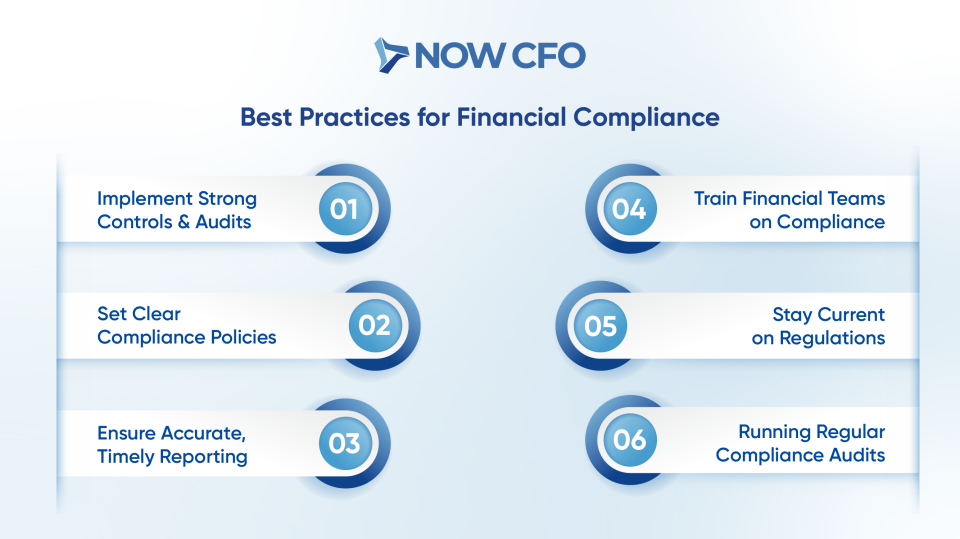
1. Implement Robust Internal Controls and Financial Auditing Systems
Effective internal controls start with mapping high-risk cycles to identify points where errors or fraud might occur. Establish segregation of duties, automated approvals, and continuous monitoring dashboards so anomalies surface instantly.
Pair these controls with an annual internal audit plan that integrates both surprise audits and thematic reviews. According to the U.S. GAO, the IRS still has 42 open recommendations tied to internal-control weaknesses.
By documenting control of ownership, test frequency, and remediation deadlines, CFOs embed accountability into day-to-day operations and align with SOX compliance expectations.
2. Establish Clear Compliance Policies and Procedures
Before launching any initiative, codify expectations:
- Assign process owners for each regulation (SOX, GDPR, tax).
- Write step-by-step procedures for approvals, disclosures, and exception handling.
- Publish version-controlled manuals on the intranet and require electronic sign-off to verify reading.
- Set policy-change SLAs, for example, update manuals within 30 days of a new rule.
This clarity transforms abstract mandates into actionable; department-level tasks and supports best practices for ensuring financial compliance by eliminating ambiguity.
3. Ensure Accurate and Timely Financial Reporting
Reliable reporting hinges on disciplined close calendars and technology-driven reconciliations. Configure your ERP to auto-post recurring entries, flag out-of-period transactions, and lock periods once reviewed.
Use variance-analysis dashboards to notify managers when account balances deviate beyond tolerance. Align disclosures with financial reporting standards (IFRS or GAAP) and create a “red-flag” committee that meets mid-close to resolve issues quickly.
4. Invest in Compliance Training for Financial Teams
Policies fail without skilled people. Launch a multilayer training program that covers foundational regulations for new hires and quarterly refreshers on recent legal changes. Incorporate interactive case studies; restatement failures, privacy breaches; to keep sessions relevant.
Track completion in an LMS and tie participation to performance reviews. This investment reinforces financial governance and ensures staff can execute risk mitigation strategies under pressure.
5. Stay Updated on Changing Regulatory Requirements
Laws evolve; CFOs cannot rely on static frameworks. They must:
- Subscribe to Official Bulletins: Receive real-time alerts from the Federal Register, IRS Newsroom, and SEC.
- Participate in Professional Networks: Join CFO councils, compliance consortiums, and peer-to-peer forums.
- Conduct Quarterly Impact Analyses: Co-author memos with legal teams outlining implications for policies, systems, and training.
- Update Control Matrices Promptly: Reflect new requirements in control-testing schedules and evidence repositories.
6. Conduct Regular Compliance Audits and Risk Assessments
Continuous assurance processes detect evolving threats. CFOs:
- Perform Quarterly Internal Audits: Rate each control’s design and operating effectiveness and compare scores over time.
- Maintain a Live Risk Register: Catalog risks by likelihood and potential financial impact, updating mitigation plans as circumstances change.
- Benchmark Against External Reviews: Incorporate findings from external auditors to validate internal perceptions.
- Track Remediation Dashboards: Monitor open findings until closure, ensuring no deficiencies remain unresolved.
Learn More: CFOs and the role of financial analytics
How CFOs Can Mitigate Financial Risk Through Compliance
By integrating Financial Compliance and Regulation into risk frameworks, CFOs enhance financial governance and tighten risk mitigation strategies. Below, we explore core tactics to preempt and manage compliance risks.
Identifying And Addressing Compliance Risks Early
Proactive risk identification begins with mapping high-risk processes—tax reporting, SOX controls, and data privacy. CFOs deploy risk registers and scenario analyses to flag vulnerabilities before they materialize. In FY 2023, only 54 percent of federal CFO Act agencies fully complied with improper payment criteria, underscoring the need for early detection gao.gov. By prioritizing these insights, finance leaders can allocate resources efficiently and avert costly violations.
Managing Financial Data Transparency And Accuracy
To maintain regulatory adherence, CFOs:
- Implement Real-Time Dashboards: Monitor KPIs like revenue recognition and cash flows.
- Standardize Data Definitions: Ensure uniform chart of accounts across entities.
- Automate Reconciliations: Use software to match transactions and flag discrepancies.
- Enforce Data Segregation: Limit access rights to critical financial systems.
These measures support strategies for maintaining financial transparency and bolster financial risk management.
Collaborating With Legal Teams For Regulatory Updates
Close finance–legal collaboration ensures compliance with evolving statutes. CFOs should:
- Schedule Monthly Briefings: Review new regulations, such as tax code amendments or IFRS updates.
- Joint Impact Assessments: Quantify financial effects of proposed rules on budget and controls.
- Draft Policy Revisions: Align internal manuals with legal counsel’s interpretations.
- Coordinate Filings: Prepare disclosures and certifications with legal sign-off.
This partnership fortifies CFO compliance strategies and keeps teams informed of shifting obligations.
Establishing A Proactive Approach To Risk Management
CFOs cultivate a forward-looking stance by embedding compliance in strategic decision-making. They integrate control assessments into capital planning, stress-test scenarios for regulatory changes, and institute “risk-off” thresholds for key ratios. This proactive ethos transforms reactive audits into continuous improvement, ensuring that Financial Compliance and Regulation underpins sustainable growth.
- In FY 2024, federal agencies reported approximately $162 billion in improper payments—an 84 percent concentration in five program areas—highlighting systemic gaps in oversight gao.gov.
Leveraging Technology to Ensure Financial Compliance
Integrating technology into CFO compliance strategies accelerates regulatory adherence and strengthens financial governance. Below are four key ways to deploy tech for seamless compliance.
Using Financial Software For Real-Time Reporting And Auditing
By centralizing data in cloud-based platforms, CFOs achieve on-demand visibility into transactions and controls. Key actions include:
- Deploying Integrated ERPs: Link general ledger, accounts payable, and revenue modules to produce unified, up-to-the-minute reports.
- Configuring Audit Trails: Enable immutable logs for every transaction, facilitating rapid investigations.
- Setting Alerts: Automate notifications for variance thresholds or policy breaches.
These practices embody best practices for ensuring financial compliance, empowering teams to correct discrepancies immediately and support strategies for maintaining financial transparency.
Automating Regulatory Filings And Compliance Checks
Automation reduces manual errors and frees finance teams for analysis. CFOs should:
- Schedule E-filings: Use software to submit tax returns and SEC reports (10-K, 10-Q) on preset dates.
- Embed Rule Engines: Configure checks for data formats, calculation logic, and disclosure requirements.
- Generate Audit Reports Automatically: Produce compliance documentation—control matrices, evidence logs—at the click of a button.
This approach bolsters financial risk management by ensuring deadlines and formats always meet regulatory specifications.
Tracking Compliance Metrics And Financial Data
CFOs implement dashboards to monitor KPIs—control effectiveness, training completion, and audit findings—in real time. By standardizing definitions (e.g., revenue recognition rules) and integrating data from ERP, CRM, and payroll, they ensure consistency across reports. Continuous monitoring highlights trends in exception rates and supports risk mitigation strategies through proactive intervention.
Enhancing Data Security To Meet Regulatory Standards
To safeguard financial data under GDPR, SOX, and other mandates, CFOs must:
- Encrypt Data at Rest and In Transit: Apply AES-256 encryption for databases and TLS for network links.
- Implement Access Controls: Use role-based permissions and multifactor authentication for finance systems.
- Conduct Regular Penetration Tests: Engage third-party firms to probe for vulnerabilities every six months.
- Maintain Incident Response Plans: Define workflows for breach detection, notification (within 72 hours under GDPR), and remediation.
Organizations still running legacy systems face heightened risk: as of September 2022, 1,111,419 out of 4,821,033 software instances—about 23 percent—in the IRS environment were classified as legacy, underscoring the urgency of modernization gao.gov.
Common Compliance Mistakes and How to Avoid Them
To strengthen financial governance and prevent lapses in regulatory adherence, CFOs must recognize typical pitfalls and embed CFO compliance strategies at every level.
Ignoring Small Regulatory Changes
Even minor amendments can trigger non-compliance. CFOs should:
- Monitor Official Bulletins: Subscribe to updates from agencies like the IRS and SEC.
- Assign Review Ownership: Designate team members to assess each change’s impact.
- Adjust Policies Promptly: Incorporate new rules into compliance manuals within 30 days.
- Log Updates: Maintain a change register for audit trails.
Failing to track small shifts undermines best practices for ensuring financial compliance and inflates financial risk management costs.
Failing To Conduct Regular Compliance Reviews
Routine reviews catch deviations early. CFOs schedule quarterly internal audits covering SOX controls, tax provisions, and data privacy. In December 2023, 98 percent of FDIC-supervised institutions achieved “Satisfactory” or better compliance ratings—demonstrating that regular reviews correlate with robust control environments fdic.gov. By documenting findings and tracking remediation, CFOs uphold financial reporting standards and reduce the chance of material weaknesses.
Overlooking The Importance Of Data Security For Financial Compliance
Without strong data safeguards, firms risk breaches and fines. CFOs must:
- Encrypt Sensitive Records: Use AES-256 for databases.
- Control Access: Implement role-based permissions and MFA.
- Audit Logs: Retain logs for at least five years.
- Test Incident Plans: Run annual tabletop exercises.
These steps reinforce risk mitigation strategies and ensure that the role of the CFO in risk management and compliance extends to cybersecurity.
Underestimating The Role Of Training In Regulatory Adherence
Effective policies falter without trained staff. CFOs develop tailored programs—covering SOX controls, tax updates, and data-privacy mandates. They deliver interactive workshops every quarter and link completion to performance metrics. By embedding compliance education into career paths, organizations sustain financial governance and uphold CFO financial reporting and governance best practices.
Benefits of Proactive Compliance Strategies for CFOs
By adopting forward-looking CFO compliance strategies, finance leaders minimize exposure and cultivate trust. Below are key advantages that proactive compliance delivers.
Reduced Risk Of Financial Penalties And Legal Action
Proactive controls shield organizations from costly enforcement. For example, Hino Motors incurred a $521.76 million criminal fine in March 2025 for Clean Water Act violations—illustrating the stakes of non-compliance (Source: U.S. Department of Justice, Corporate Crime Case Database) justice.gov. By contrast, firms with mature compliance programs report 50 percent fewer regulatory inquiries annually, per a Government Accountability Office study on corporate governance (GAO–20–540). Implementing clear policies and automated checks ensures CFOs mitigate such financial and reputational risks.
Improved Stakeholder Confidence And Transparency
CFOs enhance financial risk management by openly sharing compliance metrics:
- Public Disclosures: Publish audit summaries and control frameworks in annual reports.
- Real-Time Dashboards: Offer investors live views of compliance KPIs.
- Certifications & Seals: Obtain external validations (e.g., SSAE 18 SOC 1 reports).
These measures satisfy regulatory adherence, reassure boards, and boost investor trust in the integrity of financial reporting standards.
Enhanced Financial Reporting Accuracy And Timeliness
When CFOs integrate compliance into closing processes, they:
- Automate reconciliations to reduce manual errors.
- Enforce cut-off rules aligned with IFRS and GAAP.
- Schedule rolling reviews to catch discrepancies before filing deadlines.
This approach delivers best practices for ensuring financial compliance—cutting restatements by up to 60 percent, according to a federal audit review gao.gov.
Stronger Internal Controls And Business Integrity
Embedding controls across procure-to-pay and revenue-recognition workflows fortifies financial governance. CFOs conduct regular control self-assessments, document remediation plans, and track issue resolution to ensure continuous improvement and audit readiness.
Long-Term Sustainability Through Regulatory Adherence
Sustained compliance underpins scalable growth. By monitoring legislative trends, investing in technology, and fostering a compliance-first culture, CFOs ensure that Financial Compliance and Regulation drives resilience—and positions the organization for long-term success.
How to Choose the Right Financial Tools for Compliance
Aligning software with compliance objectives ensures CFO compliance strategies succeed. The right platform supports regulatory adherence, streamlines controls, and adapts as your business evolves.
Look For Tools That Align With Your Regulatory Needs
Identify solutions built for your jurisdiction and industry:
- SOX-Ready Modules: Preconfigured workflows for Sarbanes-Oxley control testing.
- Tax-Code Integration: Automatic updates for federal, state, and local tax rules.
- IFRS/GAAP Support: Dual-reporting frameworks for financial reporting standards.
- Data-Privacy Features: GDPR and CCPA compliance templates.
According to the U.S. Treasury, over 80 percent of banks are in “adoption” or “early adoption” phases of cloud-based compliance tools—demonstrating urgency in tailored solutions home.treasury.gov.
Assess Their Ability To Automate Compliance Processes
Automation accelerates best practices for ensuring financial compliance: AI-driven rule engines validate transactions, scheduled e-filings submit 10-K and 10-Q reports, and audit-evidence collection happens in real time. Choose platforms with low-code configuration and APIs to integrate with ERPs, elevating financial risk management.
Verify Data Security Capabilities To Meet Regulatory Standards
Ensure providers offer:
- AES-256 Encryption: For data at rest and in transit.
- Role-Based Access Controls: Limit sensitive modules to authorized users.
- Continuous Monitoring: Real-time alerts on anomalous activity.
In CISA’s 2025 Cybersecurity Performance Goals report, 89 percent of enrolled organizations implemented DMARC email protections—highlighting the critical role of built-in security protocols cisa.gov.
Ensure Scalability For Changing Compliance Requirements
Opt for modular architectures that allow you to add new compliance packs—for emerging regulations like IFRS 17 or updated GDPR provisions—without overhauling your stack. Cloud-native solutions provide seamless upgrades, ensuring your Financial Compliance and Regulation framework grows with your enterprise.
Conclusion: Maintaining Business Integrity Through Financial Compliance
Taking proactive steps today can fortify your organization against tomorrow’s regulatory challenges. By embedding Financial Compliance and Regulation into every decision and process, CFOs not only mitigate the risk of costly penalties but also cultivate stakeholder trust and operational resilience.
Ready to elevate your compliance framework? Schedule a free consultation with NOW CFO’s expert advisors to assess your current controls and identify improvement opportunities. Prefer a direct conversation?
Give us a call at (555) 123-4567 to discuss how tailored CFO compliance strategies can streamline your reporting, enhance data security, and ensure ongoing adherence to evolving standards. Let NOW CFO partner with you to transform compliance from a mandated task into a strategic advantage—securing your financial integrity and driving sustainable growth.
Financial modeling empowers businesses to counter uncertainty with clarity. By constructing versatile financial models, outsourced CFOs transform raw data into strategic roadmaps that drive data-driven decision-making.
Of the SMEs that applied with CDFIs, 88% secured at least some financing, illustrating how robust financial planning enhances access to capital. Embracing financial planning and analysis, companies can optimize budgets, perform scenario analysis, and evaluate the benefits of financial modeling for businesses.
What is Financial Modeling and Why is it Important?
Before examining specific applications, it’s essential to ground our discussion in a clear definition of financial modeling and understand its pivotal role in strategic planning.
Defining Financial Modeling in Business
Financial modeling is the construction of abstract representations of a company’s financial performance using quantitative methods. Financial modeling integrates accounting data, market assumptions, and statistical techniques to forecast revenues, expenses, and cash flows.
According to BLS, employment of financial analysts, key model builders is projected to grow 9% from 2023 to 2033, much faster than average. An effective model becomes a decision-making engine, illuminating paths to optimizing working capital, evaluating investment opportunities, and assessing growth strategies.
The Role of Financial Modeling in Financial Planning and Decision-Making
Effective CFO financial modeling strategies emphasize integrating robust models into ongoing planning cycles. Financial models serve three primary functions:
- Forecast Accuracy: Enhances budgeting and financial forecasting precision, reducing variance between projected and actual results.
- Scenario Analysis empowers leaders to test “what-if” cases, examining the best, worst, and most likely outcomes, to inform risk mitigation.
- Strategic Alignment: Aligns capital allocation with growth objectives, ensuring resources drive the highest returns.
Learn More: Cash Flow Optimization: Tips from an Outsourced CFO
Types of Financial Models Used by Outsourced CFOs
Building on our understanding of financial Modeling, outsourced CFOs deploy specialized frameworks to translate assumptions into actionable forecasts. These business financial models underpin robust financial planning and analysis, guiding capital allocation and risk management across diverse scenarios.
Cash Flow Forecasting Models
Outsourced CFOs create dynamic cash flow forecasting models to map inflows and outflows over time, ensuring businesses maintain adequate liquidity. By projecting receipts, disbursements, and timing gaps, CFOs anticipate shortfalls and optimize working capital.
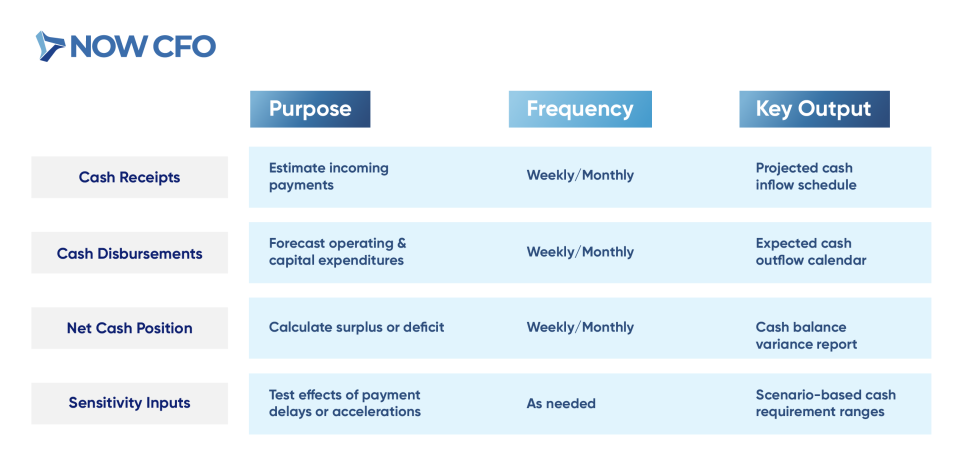
Budgeting and Financial Planning Models
CFOs leverage budgeting models to align resources with strategic goals, layering expense categories against revenue drivers. These models enable iterative planning cycles, comparing actual results against budgets and refining forecasts.
| Budget Element | Planning Focus | Review Cycle | Decision Support |
|---|---|---|---|
| Revenue Drivers | Sales volumes, pricing strategies | Quarterly | Revenue variance analysis |
| Fixed Costs | Rent, salaries, utilities | Quarterly | Break-even and cost-control measures |
| Variable Costs | Materials, commissions | Quarterly | Margin enhancement opportunities |
| Capital Expenditures | Investments in equipment & technology | Annual | ROI and payback period calculations |
These financial planning and analysis models underpin strategic budgeting, enabling CFOs to adapt spending and investments as market conditions evolve.
Valuation and Investment Models
Valuation models estimate enterprise value using DCF, comparable, or precedent transactions. CFOs calculate free cash flows, apply appropriate discount rates, and perform sensitivity tests on terminal value assumptions. Investment models assess IRR and NPV for potential projects, guiding capital expenditure decisions.
Scenario and Sensitivity Analysis Models
Scenario models allow CFOs to simulate best-case, base-case, and worst-case outcomes by altering key assumptions such as growth rates, cost inflation, and financing terms.
Sensitivity analysis isolates individual drivers, like price changes or margin shifts, to quantify their impact on financial metrics, strengthening risk mitigation strategies.
Merger and Acquisition (M&A) Financial Models
When evaluating M&A opportunities, outsourced CFOs:
- Develop pro forma financial statements reflecting combined entities.
- Model purchase price allocations, goodwill, and tax impacts.
- Analyze accretion/dilution effects on EPS and cash flow.
- Stress-test integration scenarios to ensure post-deal synergies.
These types of financial models ensure stakeholders understand transaction value and risks before execution.
Learn More: CFOs and the Role of Financial Analytics
The Power of Financial Modeling in Business Growth
Having explored core model types, it’s clear that financial modeling drives tangible growth outcomes. Below, we examine how financial forecasting, scenario analysis, and data-driven decision-making empower companies to scale, adapt, and thrive.
Helping Businesses Forecast Future Performance
Outsourced CFOs employ cash flow forecasting and rolling forecasts to predict revenue streams and working capital needs precisely. They generate dynamic projections that adapt to real-time inputs by integrating historical data and market trends.
Accurate forecasts reduce variance between plan and reality, guiding timely pricing, inventory, and staffing adjustments. Over 48% of organizations use rolling forecasts to steer operations and financial plans, underscoring forecasting’s role in resilience and agility.
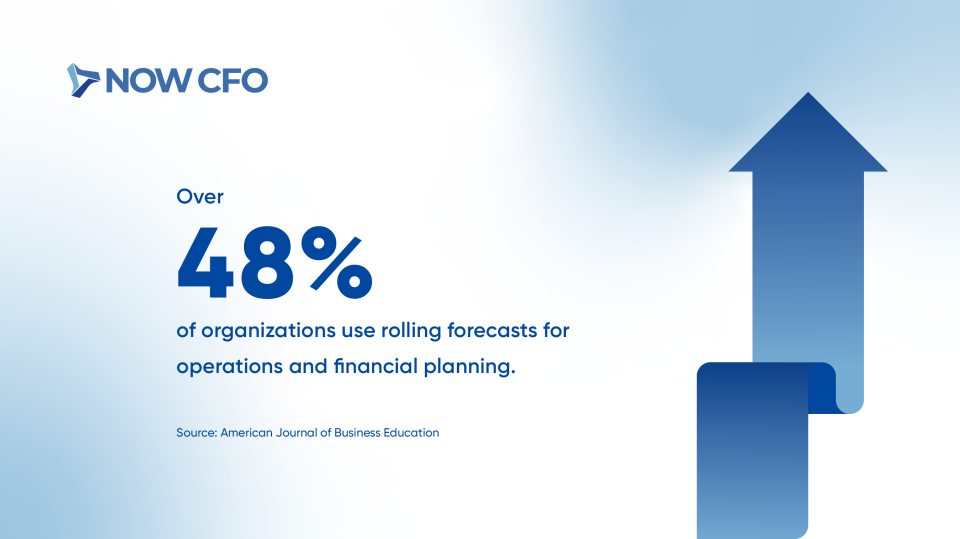
Source: American Journal of Business Education
Supporting Strategic Decision-Making with Data-Driven Insights
Connecting robust forecasts to high-level strategy, outsourced CFOs turn models into decision engines:
- Performance Dashboards: Visualize KPIs, such as revenue growth, margin trends, and cash conversion, to track strategy execution.
- Driver Analysis: Decompose revenue into volume, price, and mix to pinpoint growth levers.
- Investment Prioritization: Rank projects by NPV and IRR to allocate capital where it yields the highest returns.
These business financial models infuse data-driven decision-making into boardroom discussions, aligning financial plans with strategic ambitions.
Optimizing Resource Allocation and Capital Structure
To maximize ROI, CFOs leverage models that test financing mixes—debt versus equity—and capital deployment:
- Capital Budgeting Models: Evaluate CapEx proposals by forecasting cash flows and payback periods.
- Debt Capacity Analysis: Assess interest coverage ratios and covenant headroom for optimal leverage.
- Working Capital Optimization: Simulate receivables, payables, and inventory scenarios to free up cash.
This CFO financial modeling strategy ensures resources target high-impact initiatives while maintaining a healthy balance sheet.
Identifying Potential Risks and Opportunities
With scenario analysis, outsourced CFOs stress-test assumptions across multiple futures:
- Downside Scenarios: Model revenue shocks, cost inflation, or supply disruptions to gauge cash-burn rates.
- Upside Scenarios: Simulate market share gains or product launches to forecast incremental profits.
- Sensitivity Analysis: Vary one driver, price or volume, to quantify its effect on EBITDA and cash flow.
Such scenario analysis pinpoints vulnerabilities and uncovers upside potential, enabling proactive risk management.
Enhancing Long-Term Financial Planning and Strategy
Over multi-year horizons, CFOs build integrated models linking income statements, balance sheets, and cash flows. These strategic roadmaps incorporate growth targets, capital raises, and dividend policies.
By projecting ten-year horizons, companies align long-term financial planning with corporate vision, ensuring sustainable growth, robust liquidity, and shareholder value creation.
Learn More: Working Capital Management
How Outsourced CFOs Leverage Financial Modeling for Success
Transitioning from growth levels to execution, outsourced CFOs apply the power of financial modeling across processes, ensuring forecasts evolve into precise, strategic actions that drive performance.
Using Financial Models to Create Accurate Projections
Outsourced CFOs construct detailed projections by linking historical financials with forward-looking assumptions. They calibrate revenue drivers: pricing, volume, and seasonality, and model cash flow forecasting to predict liquidity needs.
These models integrate financial planning and analysis tools to update forecasts as new data arrives, reducing variance between projected and actual results. By embedding sensitivity checks, CFOs refine assumptions, enhancing projection accuracy and enabling proactive capital management.
In FY2023, small businesses in SBA’s 7(j) program achieved a 60% contract win rate, reflecting improved forecasting and planning capabilities. Those same businesses reported 45% average annual revenue growth, demonstrating the return on precise projection models.
Analyzing Different Business Scenarios for Strategic Insights
Connecting projections to decision frameworks, CFOs employ scenario analysis to stress-test plans under varied conditions:
- Base-Case Scenario: Uses management’s most likely assumptions for sales growth and cost trends.
- Upside Scenario: Models aggressive market penetration, higher financial forecasting accuracy, and improved margins.
- Downside Scenario: Simulates economic downturns, supply-chain disruptions, or pricing pressure.
Integrating Financial Models into Business Decision-Making Processes
To embed business financial models into operations, CFOs:
- Dashboard Integration: Link models to real-time dashboards, visualizing KPIs like cash conversion cycle and EBITDA variance.
- Decision Gates: Require model-backed justification for capex, hiring, or pricing changes.
- Board Reporting: Standardized model outputs inform executive and investor discussions.
Customizing Financial Models to Meet Business-Specific Goals
CFOs tailor financial modeling frameworks to unique firm objectives:
- Growth-Stage Startups: Emphasize burn-rate projections and fundraising milestones.
- Mature Companies: Focus on dividend policies, debt-service capacity, and scenario analysis for new product lines.
- Industry-Specific Drivers: Incorporate metrics like same-store sales for retailers or utilization rates for service firms.
Adjusting Financial Models as Market and Business Conditions Change
Outsourced CFOs routinely revise models to reflect evolving realities. They update assumptions for interest rates, commodity prices, or regulatory shifts, recalibrate growth forecasts, and re-run sensitivity analysis on key drivers.
This agility preserves model relevance, ensuring the financial modeling continues to inform strategic pivots and maintain competitive advantage.
Learn More: Outsourced CFO Services for Budgeting and Forecasting
Key Benefits of Financial Modeling for Business Leaders
With precise growth mechanics defined, business leaders harness the financial modeling to realize tangible advantages. Below, we explore how financial planning and analysis deliver clarity, precision, and strategic alignment.
Clearer Understanding of Financial Health and Performance
By constructing integrated business financial models, outsourced CFOs offer leaders a panoramic view of balance sheets, income statements, and cash flows. These models dissect profitability drivers, so executives grasp underlying trends.
With scenario overlays, companies visualize how shifts in pricing or volume ripple through liquidity and equity. This heightened transparency empowers stakeholders to spot efficiency gaps and monitor covenant compliance.
Improved Accuracy in Forecasting and Budgeting
Connecting financial clarity to precision planning, outsourced CFOs embed rigorous statistical methods into budgets:
| Metric | Pre-Model Variance | Post-Model Variance | Improvement (%) |
|---|---|---|---|
| Annual Revenue Forecast | ±12.5% | ±3.0% | 76% |
| Operating Expense Budget | ±15.0% | ±4.2% | 72% |
| Cash Flow Projection | ±18.0% | ±5.5% | 69% |
Enhanced Ability to Evaluate Business Scenarios and Opportunities
Outsourced CFOs strengthen decision agility by layering “what-if” analyses into models. Leaders compare expansion plans, new product launches, or pricing changes on metrics like NPV and IRR.
Better Preparedness for Uncertainty and Market Fluctuations
Through stress-testing and sensitivity matrices, financial models reveal how external shocks affect liquidity and solvency. CFOs set trigger thresholds for covenant breaches and cash reserves, ensuring rapid response protocols.
Stronger Alignment Between Financial Strategy and Business Goals
Outsourced CFOs embed financial metrics into corporate scorecards by translating strategic objectives into quantifiable targets. This alignment guarantees that budgeting, investment, and operational plans drive toward common goals.
The outcome is the seamless integration of financial strategy with growth ambitions, anchoring day-to-day decisions based on financial modeling.
Learn More: Benefits of hiring an outsourced CFO
How to Implement Financial Modeling in Your Business with an Outsourced CFO
To translate modeling power into practice, outsourced CFOs guide companies through a structured implementation process. Below, we outline the five critical steps to embed financial modeling into your operations and strategic planning.
Identifying Key Financial Metrics and Business Goals
First, the CFO collaborates with leadership to pinpoint key performance Indicators, revenue growth rates, gross margin percentages, and cash‐conversion cycles that align with corporate objectives. They then set targets for metrics such as:
- Revenue Growth Rate: Annual percentage increase benchmark.
- EBITDA Margin: Operating profitability goal.
- Working Capital Turnover: Days sales outstanding vs. days payables outstanding.
- Debt Service Coverage Ratio: Minimum covenant threshold.
Collaborating With the CFO to Build and Refine Financial Models
Once metrics are set, the outsourced CFO leads model development in partnership with finance teams:
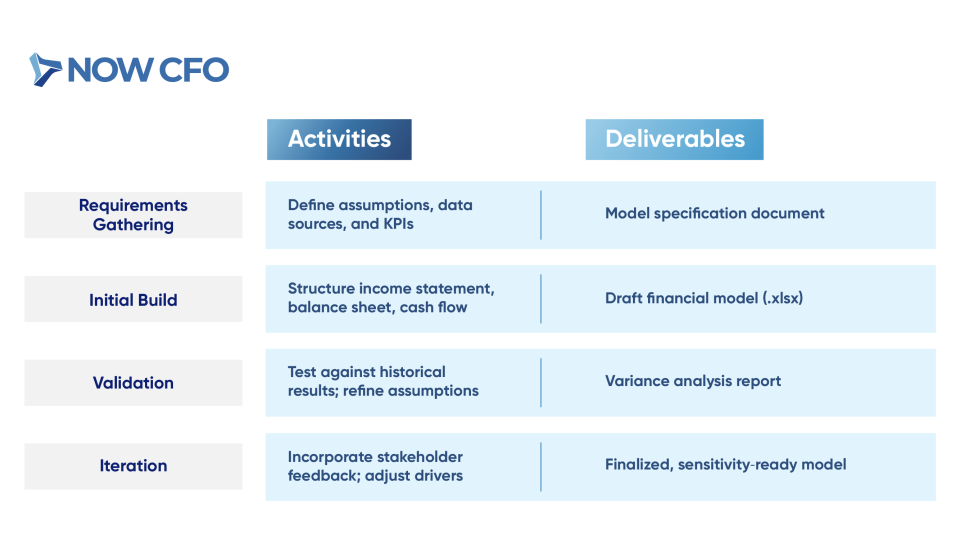
Using Financial Models to Guide Strategic Planning and Decision-Making
With a validated model, CFOs translate numbers into action plans. They run scenarios, launching new products, entering markets, or adjusting pricing. These business financial models inform board‐level discussions, ensure resource allocation aligns with growth strategies, and embed data‐driven decision‐making into corporate governance.
Continuously Monitoring and Adjusting Models Based on Performance
Effective modeling demands ongoing attention. Outsourced CFOs establish regular checkpoints:
- Monthly Variance Reviews: Compare forecast vs. actual for revenue and expenses.
- Quarterly Assumption Updates: Refresh market growth rates and cost‐inflation drivers.
- Ad Hoc Stress Tests: Re‐run downside scenarios when macro indicators shift.
Leveraging Financial Models for Investment, M&A, and Expansion Decisions
Finally, CFOs adapt core models for high‐stakes transactions. They build pro forma statements for acquisitions, simulate capital‐raise impacts, and assess greenfield expansions using discounted cash flow techniques.
By embedding scenario analysis and sensitivity tests, firms evaluate how to optimize business planning with financial models, ensuring every significant move rests on robust, numbers‐backed insights.
Learn More: Outsourced CFO supports mergers and acquisitions
Conclusion: Unlocking the Power of Financial Modeling with an Outsourced CFO
Harnessing the power of financial modeling positions your business for sustainable growth and competitive advantage. By partnering with an outsourced CFO, you can access sophisticated financial forecasting, CFO financial modeling strategies, and tailored scenario analyses that illuminate risks and opportunities.
Ready to elevate your financial planning and analysis? Schedule a complimentary strategy session with NOW CFO’s financial experts. Let’s translate complex data into clear, actionable insights that drive strategic decisions and unlock your company’s full potential.
Cash flow optimization is the foundation of a resilient financial engine, ensuring companies can meet obligations, seize growth opportunities, and weather unexpected shocks. By fine-tuning the timing of receipts and disbursements, businesses maintain healthy working capital and reduce reliance on external financing.
An outsourced CFO brings structured liquidity management and advanced cash flow forecasting to transform raw data into strategic action. When 69 percent of small businesses report variability in monthly cash balances, unpredictable cycles can disrupt payroll, supplier relationships, and investment plans.
What is Cash Flow Optimization and Why is it Important?
Effective cash flow optimization underpins every aspect of a company’s financial strategy. By ensuring income and expenses align, businesses maintain liquidity management, working capital optimization, and fund growth opportunities.
Defining Cash Flow Optimization
Cash flow optimization involves strategically managing the inflow and outflow of cash to maximize a company’s ability to meet obligations, invest in growth, and weather financial storms. It starts with accurate tracking of receipts and disbursements, empowering leaders to allocate resources efficiently.
Optimized cash flow reduces reliance on high-cost financing, such as emergency lines of credit, and strengthens the balance sheet. Only 54 percent of small business owners report a good understanding of financial management before starting a business.
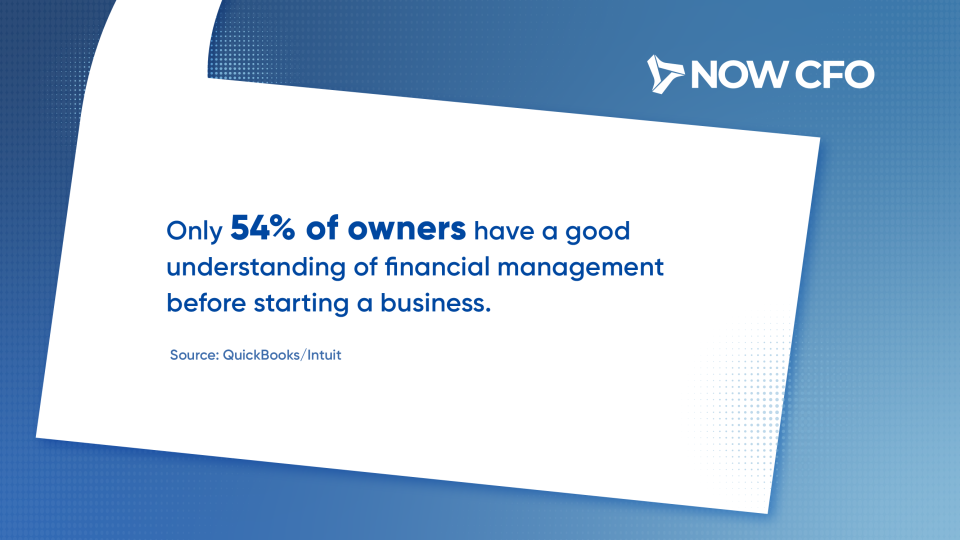
An outsourced CFO applies best practices to refine cash flow cycles. Through continuous monitoring, they spot potential shortfalls early and adjust tactics, safeguarding the business against liquidity crises.
The Role of Cash Flow Management in Financial Health
Building on a solid definition, cash flow management translates data into decisions that sustain operations and fund strategic initiatives. By regularly reviewing cash positions, leadership makes informed choices about investments, hiring, and debt repayment. Effective management balances short-term needs with long-term ambitions, reducing reliance on external funding.
Key benefits include:
- Enhanced Liquidity: Ensures bills, payroll, and suppliers are paid on time.
- Risk Mitigation: Identifies cash gaps before they impact solvency.
- Strategic Flexibility: Frees capital for marketing, R&D, or expansion projects.
- Stronger Credit Profile: Maintains healthy working capital, improving loan terms and vendor relationships.
Proven Cash Flow Optimization Strategies from an Outsourced CFO
An outsourced CFO brings discipline and expertise to cash flow optimization, translating financial data into actionable strategies. Below are some core tactics they employ to strengthen liquidity management.
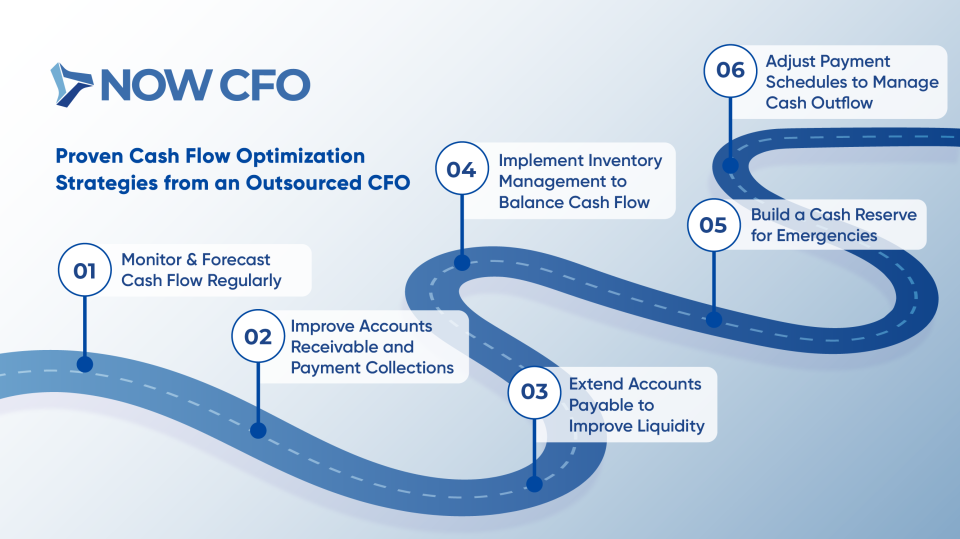
1. Monitor and Forecast Cash Flow Regularly
An outsourced CFO establishes a rolling forecast framework, updating cash projections weekly and monthly. By reconciling actuals against forecasts, they spot variances early and recalibrate assumptions. This continuous cycle sharpens decision-making, ensuring the company has timely insights to address shortfalls or capitalize on surplus cash.
They integrate drivers: such as sales pipelines and expense commitments, into dynamic models, enabling scenario analysis. Through centralized dashboards, leadership views real-time liquidity metrics, improving both operational agility and strategic planning.
2. Improve Accounts Receivable and Payment Collections
Optimizing accounts receivable accelerates cash inflows, and outsourced CFO conditions clients on faster payment cycles. They implement clear payment terms, incentivize early settlements with discounts, and enforce late-fee policies for overdue invoices.
By deploying automated invoicing and reminders, they reduce human error and administrative delays. Detailed aging reports highlight delinquent accounts, prompting targeted follow-up. In parallel, they negotiate installment plans for large customers, balancing relationship preservation with timely collections.
3. Extend Accounts Payable to Improve Liquidity
Leveraging accounts payable effectively preserves cash longer. An outsourced CFO negotiates extended terms, such as NET 60 instead of NET 30, with key vendors, aligning outflows with receivable timing.
They prioritize payables by cost of capital: slowing payments to low-risk suppliers while honoring critical ones that offer early-payment discounts. Electronic payment platforms automate scheduling, minimizing late fees and manual errors. By staggering disbursements, they maintain operational continuity without straining cash reserves.
4. Implement Inventory Management to Balance Cash Flow
Balancing stock levels is crucial for cash flow optimization. An outsourced CFO collaborates with operations to refine inventory management, reducing excess carrying costs and freeing up liquid capital.
Key actions include:
- ABC Analysis: Classify items by value and turnover, focusing on high-impact SKUs.
- Just-In-Time (JIT): Schedule deliveries to match production or sales cycles.
- Safety Stock Calibration: Maintain minimal buffers based on lead-time variability.
- Vendor-Managed Inventory (VMI): Shift reorder responsibilities to suppliers for select lines.
5. Build A Cash Reserve for Emergencies
A robust cash reserve safeguards against unexpected downturns. An outsourced CFO advises setting aside a target buffer; often three to six months of operating expenses.
They structure automated transfers to this reserve from operating accounts, ensuring consistency. Periodic stress tests simulate scenarios (e.g., revenue dips, cost spikes) to validate reserve adequacy. Maintaining this emergency fund enhances financial stability and growth, reducing dependency on high-cost credit during crises.
6. Adjust Payment Schedules to Manage Cash Outflow
Fine-tuning outgoing payments smooths cash trajectories. An outsourced CFO aligns payroll, rent, and vendor disbursements with projected inflows, often shifting non-critical payments toward later cycles.
They leverage ACH and virtual card payments, optimizing float and capturing rebates. Seasonal adjustments: such as accelerating payables during peak revenue months and deferring during slow periods, further stabilizing liquidity. This deliberate cadence prevents cash crunches and supports ongoing business growth without external funding.
Learn More: Benefits of hiring an outsourced CFO
How an Outsourced CFO Helps Businesses Optimize Cash Flow
An outsourced CFO transforms raw financials into strategic insights that drive cash flow optimization.
Using Financial Data for Cash Flow Forecasting
An outsourced CFO harnesses detailed historical data to build rolling cash projections. They update models weekly, comparing forecasts to actuals and refining cash flow optimization assumptions. This proactive planning prevents surprises and informs spending decisions.
By integrating driver-based forecasting (e.g., linking receivables to sales pipelines), they pinpoint timing gaps and adjust strategies in real time.
Identifying Cash Flow Gaps and Managing Risks
Accurate forecasts highlight periods when outflows outstrip inflows. An outsourced CFO conducts variance analysis to spot these cash flow gaps, then prioritizes corrective actions:
- Gap Quantification: Measure shortfalls by week or month.
- Risk Assessment: Evaluate solvency risk under worst-case scenarios.
- Contingency Planning: Pre-arrange lines of credit or short-term financing.
- Expense Controls: Delay non-critical spend or renegotiate terms.
Balancing Short-Term And Long-Term Cash Flow Cycles
An outsourced CFO ensures a harmony between immediate obligations and future investments. They design a phased approach to funding operations while reserving capital for growth:
Key cycle metrics:
| Cycle Type | Focus | Time Horizon | Example Metric |
|---|---|---|---|
| Short-Term | Operational liquidity | 0–3 months | Days Cash on Hand |
| Long-Term | Strategic investments | 1+ year | Free Cash Flow Growth |
Through this tailored framework, they maintain operational flexibility without jeopardizing working capital or business growth.
Advising on Financing Options to Enhance Liquidity
When internal measures fall short, an outsourced CFO evaluates optimal funding sources. They compare:
- Bank Lines of Credit: Flexible revolvers for seasonal needs.
- Invoice Factoring: Converts receivables into immediate cash.
- Short-Term Loans: Bridges one-off timing gaps.
- Equity Infusions: Bolsters reserves without debt service.
They conduct cost-benefit analyses ensuring each option aligns with the company’s risk tolerance and financial health goals. By structuring financing strategically, they reinforce cash flow optimization and seize growth opportunities without undue leverage.
Learn More: What does an outsourced CFO do
Tips for Effective Cash Flow Planning and Forecasting
Building on strategic guidance, these tips ensure your cash flow optimization efforts translate into reliable liquidity management.
Creating Accurate Cash Flow Forecasts
Accurate forecasts start with a driver-based model that links revenue streams and expense commitments. An outsourced CFO builds detailed templates, pulling data from your ERP and accounting systems to project daily, weekly, and monthly cash positions.
They layer in seasonality, payment terms, and capital expenditures to simulate multiple scenarios. By benchmarking forecasted inflows against historical trends, they refine assumptions continuously.
Adjusting Forecasts for Seasonal Business Fluctuations
Seasonal swings can distort cash projections if unaddressed. An outsourced CFO applies historical seasonality factors to smooth out peaks and troughs. They adjust line items (e.g., payroll, inventory purchases) in line with expected revenue surges or lulls.
Advance estimates show U.S. retail and food services sales rose 4.5% from March through May 2025 compared to the same period a year ago; highlighting the importance of seasonal adjustment in forecasts.
Leveraging Financial Metrics to Guide Cash Flow Decisions
With forecasts in place, key metrics transform data into decisions. An outsourced CFO tracks:
- Days Sales Outstanding (DSO): Measures the average collection period.
- Days Payable Outstanding (DPO): Gauges your payment efficiency.
- Cash Conversion Cycle (CCC): Combines DSO, DPO, and inventory turnover to assess overall flow.
Using Cash Flow Projections to Support Business Planning
Cash projections inform more than liquidity; they underpin strategic decisions. An outsourced CFO integrates forecast outputs into budgeting, capital investment planning, and hiring strategies. They evaluate:
- New Product Launches: Impact on working capital.
- Facility Expansions: Timing of cash outflows.
- Debt Repayments: Optimal schedules aligned with forecasted inflows.
Learn More: Outsourced CFO for your Business
Common Cash Flow Pitfalls and How to Avoid Them
Recognizing and rectifying common missteps is essential for cash flow optimization. An outsourced CFO identifies these traps early, streamlining liquidity management and preserving working capital.
Overlooking Accounts Receivable Aging Reports
Ignoring detailed aging schedules prevents you from spotting overdue invoices before they strain cash. An outsourced CFO reviews AR aging weekly, categorizing receivables by age: current, 30–60 days, 61–90 days, and beyond. This visibility drives targeted collection efforts and negotiations, accelerating inflows and strengthening cash flow optimization.
Underestimating Cash Flow Needs For Business Growth
Failure to project financing gaps can stall expansion. An outsourced CFO quantifies future cash requirements by aligning planned investments with forecasted inflows. They stress-test these assumptions under conservative revenue scenarios to ensure resilience.
Key Actions:
- Calculate incremental cash needs for each growth initiative.
- Model best-, base-, and worst-case revenue scenarios.
- Incorporate buffer for unexpected costs (~10 percent of projected spend).
- Review forecast variance monthly, adjusting plans dynamically.
Failing to Account for Seasonal Cash Flow Fluctuations
Seasonal revenue shifts can mislead planning if unaddressed. An outsourced CFO overlays historical seasonality indices onto base forecast; ensuring expense schedules (e.g., inventory purchases, staffing) match expected cash availability.
Preventive Measures:
- Calculate monthly seasonality factor from past 3–5 years of sales data.
- Adjust payables and receivables timing to smooth troughs.
- Establish short-term credit arrangements for lean months.
- Reforecast cash flow at each quarter to refine seasonal assumptions.
Ignoring The Impact Of Delayed Client Payments
When clients pay late, unplanned gaps emerge. An outsourced CFO implements clear payment terms (e.g., NET 30), automated reminders, and selective late-fee policies. They monitor individual client payment patterns, flagging repeat delinquents for revised credit terms or prepayment requirements.
Benefits of Cash Flow Optimization for Business Growth
Optimizing cash flow through strategic cash flow optimization efforts yields tangible benefits that propel business growth.
Enhanced Liquidity And Financial Flexibility
By prioritizing cash flow optimization, companies unlock immediate access to working capital, reducing reliance on external credit. An outsourced CFO structures cash reserves and negotiates flexible payment terms, preserving cash for strategic use.
This enhanced liquidity management allows swift responses to opportunities—such as bulk purchasing discounts or rapid hiring, without jeopardizing day-to-day operations.
Improved Decision-Making with Clear Financial Data
Clear, real-time financial insights transform decision-making:
- Visibility: Dashboards highlight cash positions and forecast variances.
- Prioritization: Teams allocate resources to high-ROI projects.
- Scenario Analysis: “What-if” models guide risk versus reward assessments.
- Accountability: KPIs (e.g., Days Cash on Hand) track performance against targets.
Ability to Seize New Growth Opportunities
When working capital is predictable, businesses can pursue expansion—launching new products, entering markets, or acquiring competitors. An outsourced CFO uses cash flow forecasting to model funding needs and timing, securing resources before commitments arise.
With a reliable cash runway, companies can invest confidently in R&D, marketing campaigns, or capital equipment purchases that fuel business growth.
In a national survey, employer startups (those with at least one employee) enjoyed a 49% survival rate over two years; compared to just 27% for nonemployer firms, illustrating how structured financial reserves support lasting growth.
Stronger Relationships with Suppliers And Clients
Consistent cash availability enhances credibility. An outsourced CFO negotiates favorable terms with suppliers while ensuring on-time payouts. Suppliers prioritize customers who pay punctually, often granting better pricing or priority allocations.
Simultaneously, clients appreciate transparent billing and reliable service, boosting retention and referrals. By embedding cash flow optimization into vendor and customer interactions, businesses reinforce trust and secure advantageous partnerships that underpin long-term success.
How to Choose the Right Outsourced CFO for Cash Flow Optimization
Selecting an outsourced CFO who excels at cash flow optimization ensures your company gains expert liquidity management support. The right partner combines technical skills with industry insight to safeguard working capital and drive sustainable growth. Below are key criteria to evaluate candidates.
Look For Experience in Liquidity Management
When vetting candidates, prioritize professionals with a proven history of enhancing cash flow optimization through robust liquidity management. Look for credits handling cash reserves, negotiating vendor terms, and structuring short-term financing during downturns.
Their track record should include documented improvements in days cash on hand and working capital ratios.
Assess Their Expertise in Cash Flow Forecasting and Planning
A seamless transition from liquidity to forecasting underscores strategic foresight. Gauge candidates on:
- Model Complexity: Ability to build driver-based rolling forecasts.
- Scenario Analysis: Proficiency with “what-if” projections under varying receivables and payables.
- Tool Fluency: Experience with ERP-integrated forecasting software.
- Review Cadence: Process for updating forecasts weekly or monthly and reconciling variances.
Verify Their Track Record in Improving Cash Flow Stability
Building forecasting skills, proven stabilizers demonstrate sustained impact. Examine past engagements for:
- Variance Reduction: Decrease in forecast-to-actual cash discrepancies.
- Credit Lines Secured: Successful negotiation of flexible lines of credit.
- Reserve Growth: Expansion of emergency cash buffers by target percentages.
- Cost Controls Implemented: Introduction of expense-review protocols reducing monthly outflows.
Ensure Alignment with Your Business’s Financial Goals
Finally, confirm that the outsourced CFO’s approach aligns with your strategic vision. They should understand your growth targets, whether scaling headcount, entering new markets, or launching products.
Clear communication on risk tolerance, investment priorities, and reporting preferences fosters a collaborative partnership that drives both financial stability and long-term value.
Conclusion: Achieving Business Growth Through Cash Flow Optimization
A deliberate approach to cash flow optimization secures the foundation for future growth. By partnering with an outsourced CFO, you benefit from expert liquidity management, precise cash flow forecasting, and proactive scenario analysis.
Ready to fortify your financial footing and unlock agile capital for new initiatives? Schedule a complimentary strategy session to discover how professional cash flow optimization can transform your business.